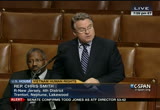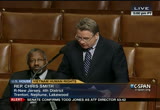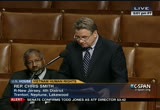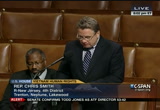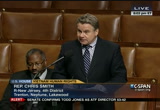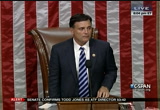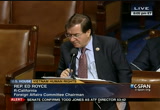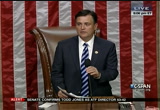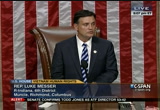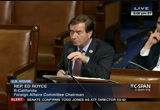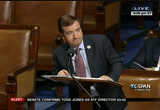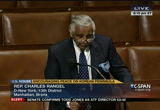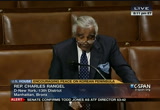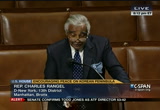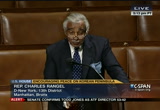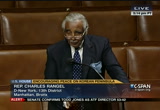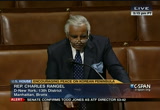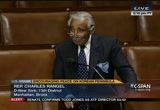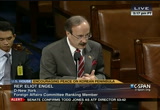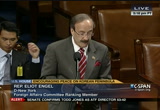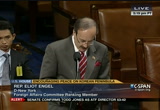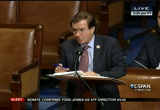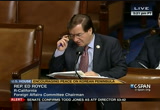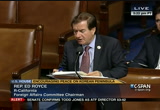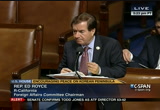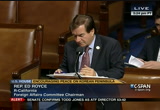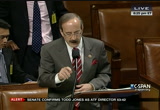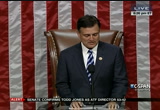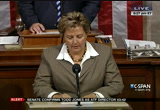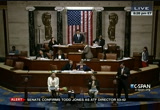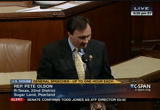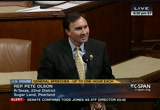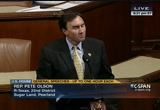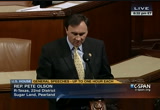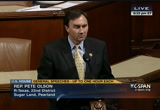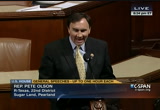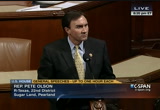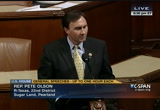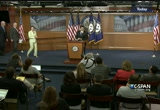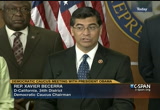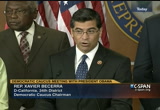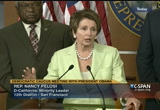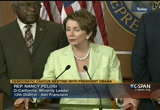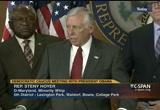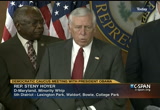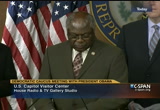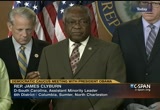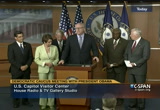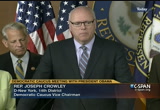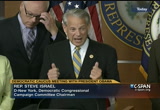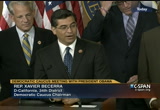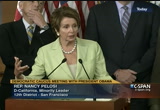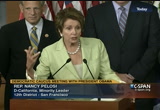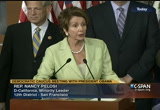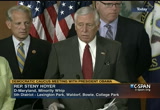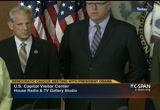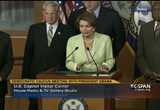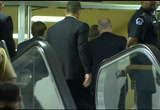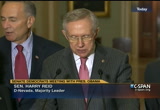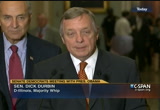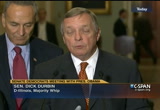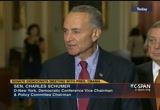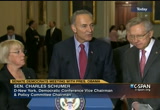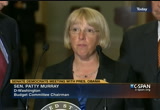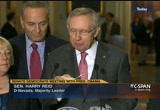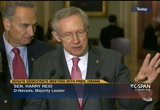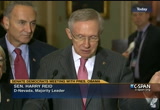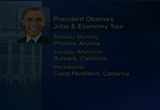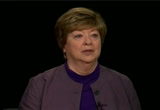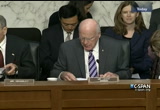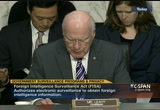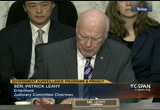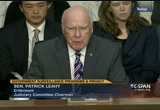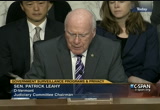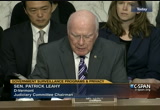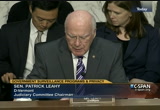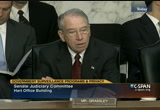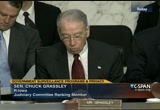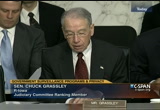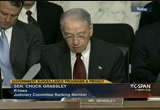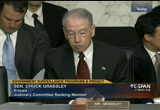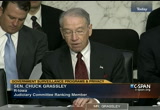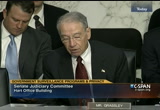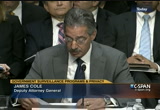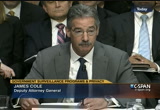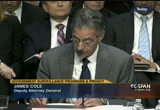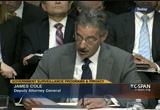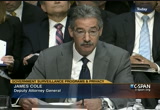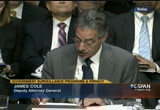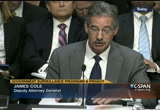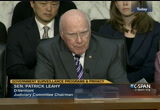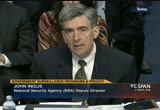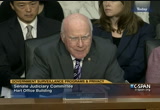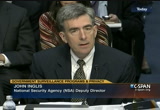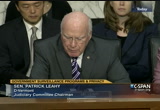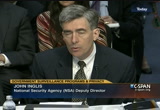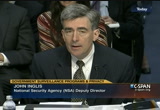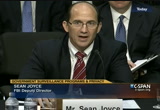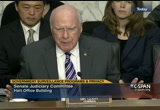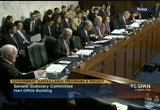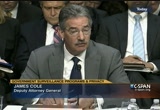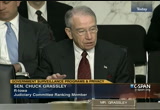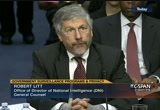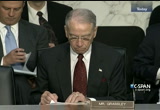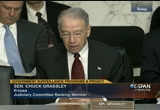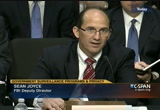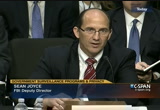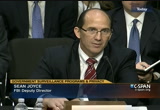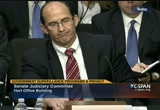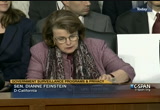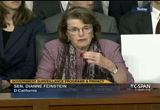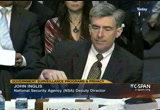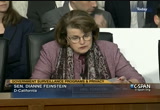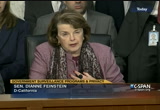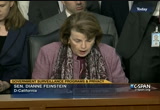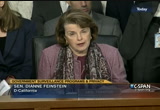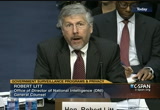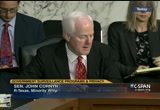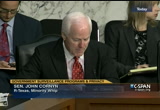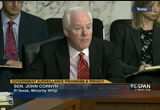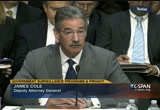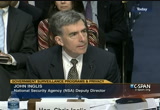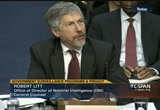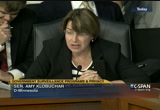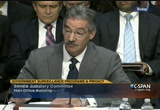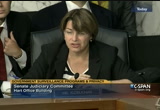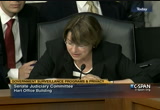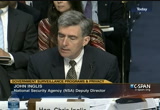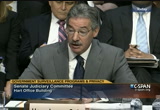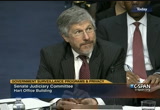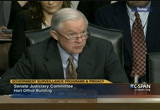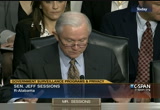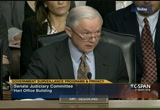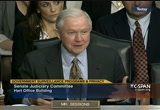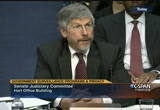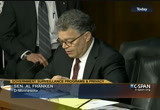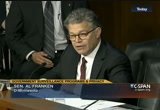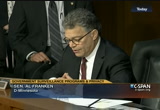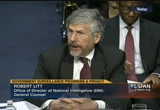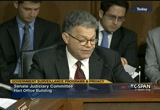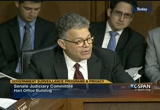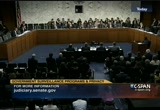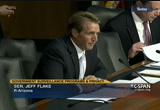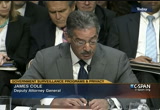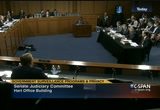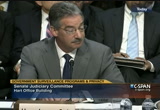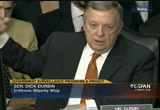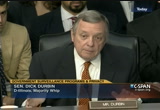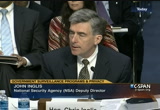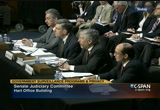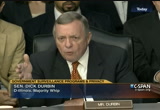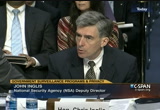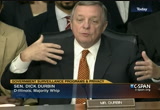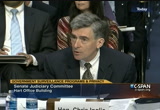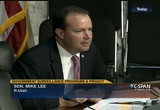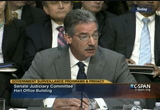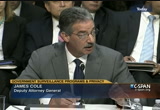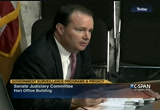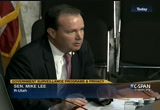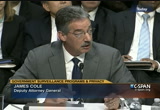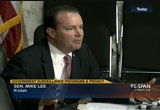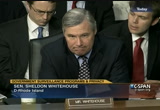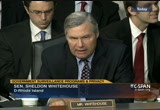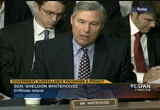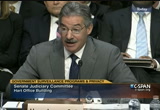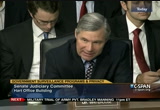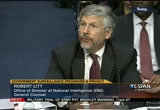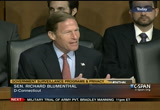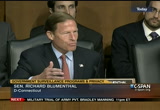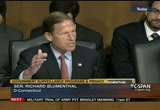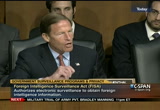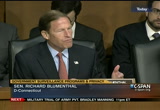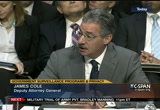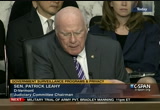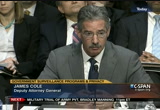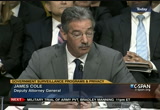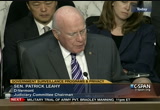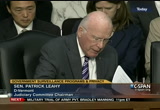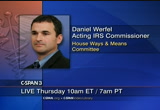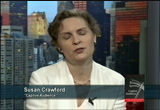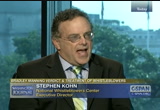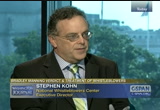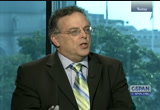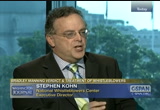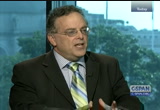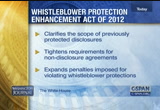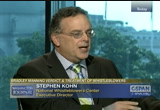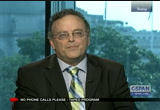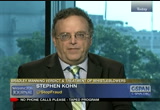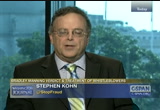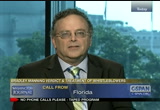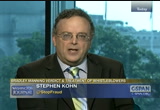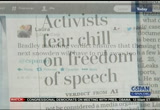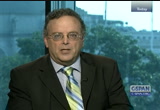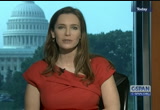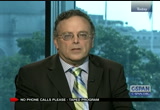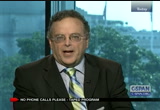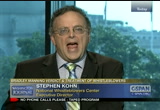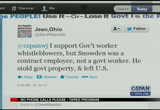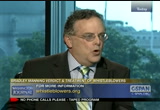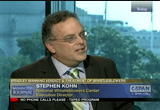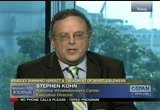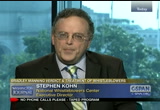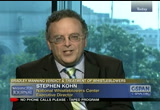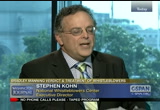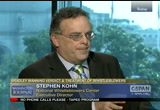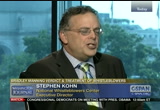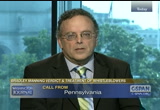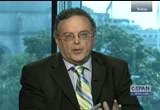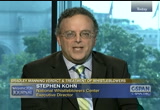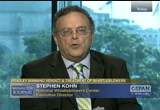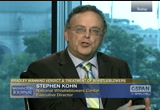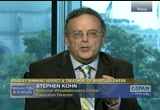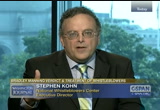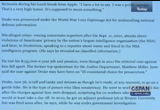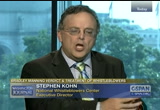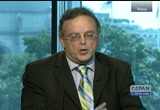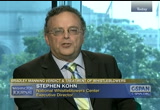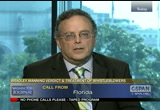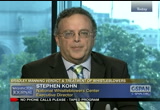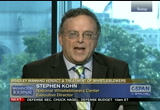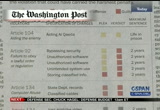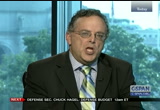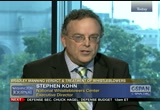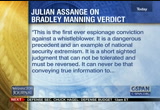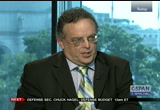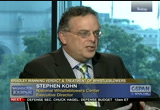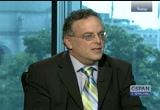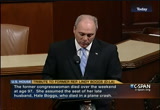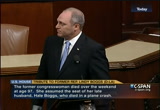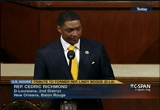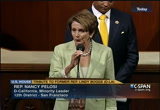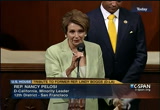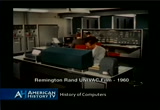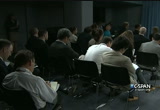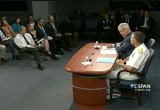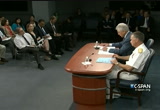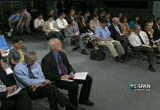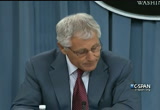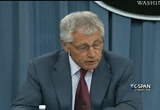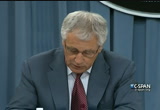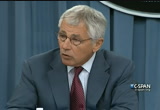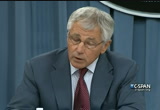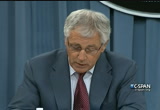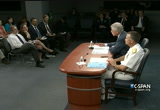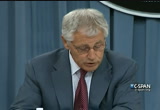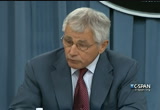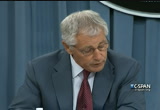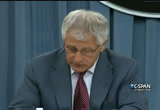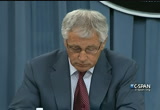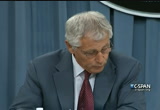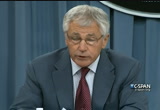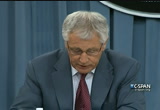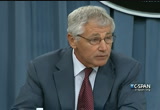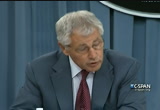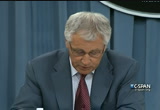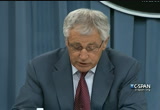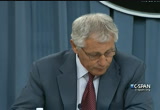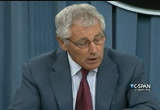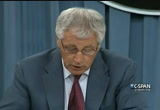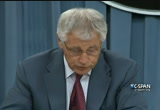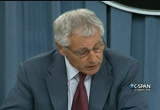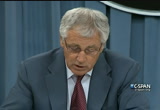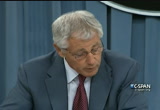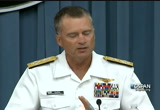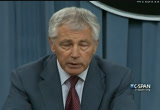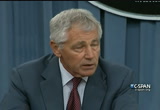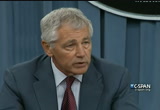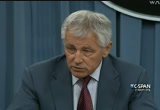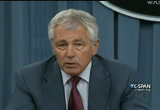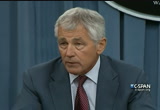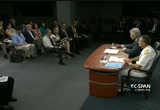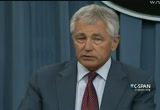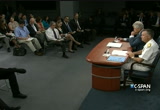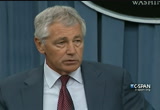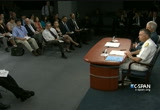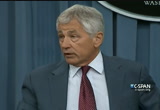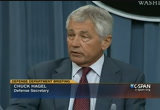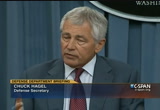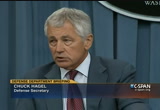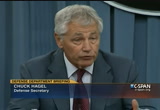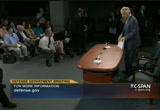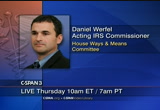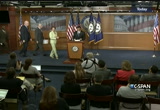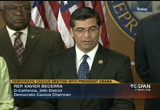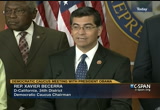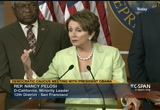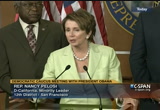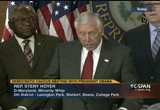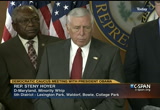tv Capitol Hill Hearings CSPAN July 31, 2013 8:00pm-1:01am EDT
8:00 pm
c.p.c. designation pursuant to the international religious freedom act of 199 . unfortunately, that was removed by president bush, a misguided move on his part, in 2006, when it was thought that the bilateral trade agreement and the permanent normal trading relations might lead to a matriculation from dictatorship to democracy, things have gotten worse since this government got this trade rights have uman suffered and real casualties have endured unspeakable hardships. mr. chairman, on several trips met, as has have chairman royce and other members and i know when you meet these people you are forever moved. courageous leaders who struggle, sacrifice, and endure, numbing hardships including torture, to promote fundamental human rights in their beloved country. many of these remarkable
8:01 pm
individuals hail from virtually every denomination of faith, christian or buddhist who suffer horrifically because of their faith. met with a great buddhist leader who has been relegated to his pagoda, he can't step one foot outside of that pagoda without the secret police rushing in. he told me if he took one step out with me to say good-bye, there would be an onslaught of these bully boys who would push and shove and worse mistreat him. a great democratic activist who was being mistreated a only one of many. not just the religious leaders in particular or individuals who are victimized by the government. entire communities are also targeted by the regime.
8:02 pm
one testified at our april 11 meeting and told my subcommittee .bout the brutality experienced individuals have been beaten to a pulp. some have died and they have confiscated their property. april 11 meeting, we heard of a sister of a vietnamese woman who was forced to work in a brothel. to liberate those women, it was the embassy in moscow that tipped off the traffickers to ensure these women were not liberated, but continued to be hurt by the traffickers. in each of these cases, weck were trafficked to jordan and those officials of the
8:03 pm
government were complicit. and that is the tip of the iceberg of this terrible come policity with heinous crimes against women. the state department and i think politically, because otherwise the state department on trafficking was a good one, but atrocity when ss it came to vietnam. i'm the prime author of the trafficing victims act and appalling that vietnam is not where it ought to be. egregious violate subject to sanctions. this will be the fourth time this bill passes, mr. speaker. we have been able to get this act passed. in 2004, 2007 and last year in 2012, iterations of this bill have gotten over to the senate
8:04 pm
o die. i hope that changes. we have seen a deterioration, as my colleagues and i have pointed out tonight in the human rights situation in vietnam. it is time to stand with the oppressed. the oppressed people who are yearning to be free. meet with them, talk with them, talk with the president, as he was here last week to meet with president obama, but lay down very specific benchmarks on simple respect for the fundamental liberties of people in vietnam who just yearn to be free and experience their god-given rights. i yield back to the distinguished jam. the speaker pro tempore: the gentleman yields back the balance of his time. the gentleman from california reserves. the gentleman from new york. mr. engel: i reserve my time. mr. royce: i will make
8:05 pm
concluding remarks at this time. the speaker pro tempore: the gentleman from california is recognized. mr. royce: i thank the gentleman from new jersey, for his dedication to human rights in general and not only his work on this bill, but again the time and energy that he has put in to attempting to intervene on behalf of those who have been subject to these beatings that e has cited, to this mall -- maltreatment, long prison terms. we had the president of vietnam visiting last week since the last visit in 2007. while we have been assured that human rights were on the agenda during the meetings with the president and state department and of course, we did all we
8:06 pm
could to make certain that they were on the agenda, but i think the vietnamese people need more than talk and that is why we need to pass this legislation. it's a sign to all vietnamese people that the u.s. is ommitted to the cause of human rights, but also leverage that can be used to guarantee some measure of attention from the regime. this is congress' chance to speak to those vietnamese people o are yearning for treem and support a human rights agenda in vietnam. i strongly urge my colleagues to support this important bill. and i yield back the balance of my time. the speaker pro tempore: the gentleman yields back the balance of his time. the gentleman from new york. mr. engel: i yield back. the speaker pro tempore: the gentleman yields back the balance of his time. the question is, will the house suspend the rules and pass the bill h.r. 18 7 as amended.
8:07 pm
those in favor say aye. -- 1897 as amended. those in favor say aye. those opposed, no. in the opinion of the chair, 2/3 being in the affirmative, the rules are suspended, the bill is passed and without objection, the motion to reconsider is laid on the table. mr. royce: we are going to request the yeas and nays. the speaker pro tempore: the yeas and nays are requested. all those in favor of taking this vote by the yeas and nays will rise and remain standing until counted. a sufficient number having arisen, the yeas and nays are ordered pursuant to clause 8 of rule 30, further proceedings on this motion will be postponed.
8:08 pm
for what purpose does the gentleman from california seek recognition? mr. royce: mr. speaker, i'm going to move at this time that the house suspend the rules and pass house concurrent resolution 41 as amended, the encouraging peace and reunification on the korean peninsula legislation. the speaker pro tempore: the clerk will report the title of the concurrent resolution. the clerk: house concurrent resolution 41, concurrent resolution encouraging peace and reunification on the korean peninsula. the speaker pro tempore: pursuant to the rule, the gentleman from california, mr. royce and the gentleman from new york, mr. engel, will each control 20 minutes. the chair recognizes the gentleman from california. mr. royce: i'm going to ask that all members may have five legislative days to revise and extend their remarks. the speaker pro tempore: the speaker pro tempore: without objection, so ordered. mr. royce: i would like to begin this debate by yielding such
8:09 pm
time as he may consume to the author of this bill, the gentleman from new york, a hero of the korean war, who served his country with valor during that tough campaign. and after surviving an onslaught y waves of chinese troops he helped his comrades to safety behind enemy lines for which he was awarded a purple heart and bronze star for valor. the gentleman from new york, mr. charlie rangel. i yield such time as you may consume. the speaker pro tempore: the gentleman is recognized mr. rangel: mr. speaker, i was prepared to respond to the
8:10 pm
chairman and ranking member for their legislative courtesies that they have extended to me and i appreciate the tribute eing paid to me, which unusually i awkwardly was unprepared for, but i do want to thank you for your friendship in more ways than just this tom who n as well as worked with your staff and my friend in new york who is on the committee staff and guided to ake certain that this almost impossible resolution was brought up to be considered by this august house. on saturday last, the president of the united states with our
8:11 pm
congressional colleague who is now the secretary of the department of defense and the secretaries of all of the armed forces groups, got together to honor the veterans of the korean war. it was a sight to see so many korean veterans from so many different parts of the country. and they were reminded by our president that we had been labeled as those who participated in what was referred to as the forgotten war. because most all of the world knew about the importance of america being involved in saving emocracy in world war ii and vietnam. good or bad, people knew people that went there. but somehow in the middle of that, no one really missed us or
8:12 pm
knew where korea was or didn't appear that there was too much concern. d when we did return, unlike the vietnam veterans who really unfairly had been treated so unkind, fortunately for us, we were never missed except by our family and friends, people never they here we were and to us. weren't as kind veterans turned out from all over. comrades that were part of the 20 countries that were part of the united nations. and when north koreans invaded south korea, those of us who were called to go to south korea to defend them, we were going to
8:13 pm
a country that we never knew to fight for a people that we never met, for causes that were not well known. having said all of that, at the conclusion, and the war has never really been called a war, it still is a division between these people, but as a result of the united states and united nations' effort, as a result of millions of lives lost, 54,000 americans, 100,000 americans wounded and close to 9,000 either captured or missing in action, one would say with all of the blood and money, what did we get out of this. and that's what we discussed saturday at the korean war veterans. what we got out of this is the integrity of the united states of america, that any commitment that we had made to the united nations, not only would we be participating, but lead as we
8:14 pm
did under the direction of general mcarthur. and today as we look back and see that out of the rubbles of a country that had been reduced by r and we take a look at what exists in the northern part as this division still exists today in communist north korea, we have seen a people that had no jobs, no homes, no resources, but they did have hope. and out of this south korean hope and dream came a nation, a new nation, a nation that demonstrated what democratic people can do. an economy was built. a friendship and partnership with the united states and freed--- freedom-loving people all over the world. we just don't say we know where korea is, we say that no matter
8:15 pm
how little a part we played that we can look back and be proud as americans that we have in a small part been possible to see this small nation become a world power, not only in terms of its military, but its friendship in terms of national defense, not only in terms of friendship, but being part of one of our wonderful trading partners that provides jobs for south koreans and americans. it only makes sense that still have the scars of the civil war, we should want koreans north and uth to find some way to find some way democracy. and that it exists in that peninsula. timnt to specifically thank
8:16 pm
of my office doing what staff does to all of us, getting people from the other body to understand how this was to the president and to the congress. and of course to the speaker's staff who worked closely with chairman ross, that's mike summers and dave snyder and on e other side of the capitol, chief of staff of senator tim kaine and on behalf of all the veterans, i can tell you as i yield back my time, back to the chairman is that we all have felt that america really did love us, they just needed an opportunity to express it. so we thank you for this resolution and it's not just for me and korea, but korean
8:17 pm
americans. so many asians and especially korean americans, they love korea but they love our country best. thank you. the speaker pro tempore: the gentleman yields back the balance of his time. he gentleman from california is mr. royce: i thank mr. rangel and i yield to the gentleman from new york, mr. engel. the speaker pro tempore: the gentleman is recognized. mr. engel: i rise in support of house concurrent resolution 41 as amened and yield myself such time as i may consume. the speaker pro tempore: the gentleman is recognized. mr. engel: i want to thank my new d and colleague from york, congressman rangel, for his various to our country in the korean war and his long service in the house of representatives and for offering this important resolution. if you grew up in new york as i did, grew up in politics everyone knows who charlie rangel is, any place in new york, new york city or new york state, and now we actually have
8:18 pm
adjoining districts, back-to-back districts, and he obviously means so much to so many people and i'm proud to call him my colleague and even more proud to call him my friend. soipt to thank congressman rangel for sponsoring this legislation, i want to thank our chairman, ed royce, for his leadership as well on this resolution. what this does is h.con.res. recognizes the historic important of the korean war which ended 60 years ago this past week. during that conflict, nearly 1.8 million american soldiers served in the at ther to defend freedom and democracy and sadly almost 55,000 were killed, over 100,000 were wounded and ,000 were listed as missing in action or prisoners or war. just as i thank congressman
8:19 pm
rangel, my good friend, i want has o say that the house other korean veterans, representative conyers, representative sam johnson, representative coble. charlie rangel and all the other korean war veterans in the house i just mentioned deserve our recognition and sincere thanks. from the wounds of that conflict, we have seen the rise of a strong alliance between the united states and south korea, the emergence of south korea as a leading economy in the world and a trading partner of the united states. this past january i visited south korea with chairman royce where we met south korea's new president and we met her when she came here and spoke before a joint session of congress a few months ago -- months ago and we met with other senior officials when we were in seoul. based on these conversations, i can tell you the u.s.-south
8:20 pm
korea relationship has never been stronger. with the continued threat posed by north korea, the u.s.-korea alliance is needed more than tover safeguard piece and -- peace and stability in that region of the world. more than 28,000 american armed services personnel serve in korea today and chairman royce and i met many of those people when we were over in korea. just as korean war veterans fought for tree. -- for freedom so too do these urrent day defenders stand ready on the korean peninsula. i reserve the balance of my time. the speaker pro tempore: the gentleman reserves. the gentleman from california is recognized. mr. royce: i close my remarks by saying i rise in strong support of this resolution and i'd like to add my voice to others grateful for the sacrifices, so many american -- grateful for the sacrifices so
8:21 pm
many americans made to protect the freedom of south korea and again to acknowledge the four members of this house, congressman charlie rangel, john conyers, sam johnson, howard coble, the veten -- veterans of that war, to thank them for their service in the and to commend congressman rangel for offering this resolution here on the 60th anniversary of this special relationship that we have with south korea. we recall that 22 nations came together to defend the republic of korea and fighting stopped three years later with an armistice that still remains in place. 5.7 million americans served during that conflict and as noted, the casualties were 56,000, you count those missing and presumed dead.
8:22 pm
over 100,000 americans wounded in that war. 140,000 south koreans killed in action. and many of whom fought side-by-side with american forces for the cause of freedom. but when you calculate the more than three million koreans -- korean civilians killed in that conflict, you begin to appreciate the enormity of the human loss. the heroic deeds of these servicemen, both korean and american, laid the foundation for that alliance we speak of here that has lasted some 60 years, but also brought relative stability as mr. rangel pointed out to northeast asia and certainly laid that foundation for the prosperity that we see in seoul and around the country today. yet korea remains a divided peninsula. this is a calamity for the
8:23 pm
korean people. the united states and south korea have spent much of the last 20 years offering to engage north korea with aid, with trade -- with diplomacy and all these nearbytives, unfortunately, have failed. the north korean response, besides its aggressive behavior toward south creequarks the regime there continues to develop nuclear weapons, to test missiles, to supply weapons to countries like iran and syria. mr. chairman, we've tried many strategies, i think only one has worked, really, and that was financial pressure. when an n 2005 undersecretary of the treasury caught north creequa counterfeiting $100 bills and so -- caught north korea
8:24 pm
counterfeiting $100 bills and so what he did was use the power of the u.s. economic system to cut off jim jong il's - cut off kim jong il's access to his foreign banks. suddenly he did not have access to those fortune banks anymore to that money when the sanctions were put on the bank of delta asia. blocking those accounts denied kim jong il the cash he needed to sustain that vast police state, to sustain that million man army, to pay for his nuclear weapons and his luxurious lifestyle and for a while, the world has his attention. far while he wanted to come back to the table. i think that approach worked. i suspect north korea will only change when it's forced to change. and i think we must resurrect a successful strategy of financial pressure. but mr. speaker, today what we
8:25 pm
do, what we dedicate ourselves to, is recognizing the 60th anniversary of the armistice agreement of the korean war, and importantly this resolution not only honors the service and sacrifices of the members of the armed forces but it also reaffirms our commitment to the u.s.-korea alliance, and this resolution sends a message that the u.s. goal remains that which thousands of americans, including four of our members, fought for. on the l remains, peace korean peninsula. i urge my colleagues to support this resolution and yield back the balance of my time, mr. speaker. the speaker pro tempore: the gentleman yields back. the gentleman from new york is recognized. mr. engel: thank you. before i yield back, i want to thoroughly embarrass my colleague and friend from new york, because we found in our cloakroom this wonderful
8:26 pm
picture and this good looking guy is charlie rangel when he was a soldier in korea and now you know why he was elected to congress. anyone who looks that good, everyone votes for. so i think this is -- it's nice to hold a picture of a hero and let me say to my colleague -- mr. rangel: thank you so much, dear colleague. mr. engel: thank you, i yield back. the speaker pro tempore: the question is, will the house suspend the rules and agree to ouse concurrent resolution 41. resolution 41 as amended. those in favor say aye. those opposed, no. in the preponderance of the chair, 2/3 being in the affirmative, the rules are suspended, the concurrent resolution is agreed to and without objection, the motion
8:27 pm
to reconsider is laid on the table. the chair announces to the speaker's appointment pursuant to section 8162 of public law 106-79 as amend and the order of the house of january 3, 2013, of the following members on the part of the house to the dwight d. eisenhower memorial commission. the clerk: mr. bishop of georgia and mr. thompson of alifornia. the speaker pro tempore: the
8:28 pm
chair lays before the house the following personal requests. the clerk: leave of absence requested for mr. meadows of north carolina for tuesday, july 30, mr. miller of florida for today, after 6:00 p.m., and for the balance of the week, and mr. young of florida for today. the speaker pro tempore: without objection. he requests are granted. under the speaker's announced policy of january 3, 2013, the gentleman from texas, mr. olson is recognized for 60 minutes as the designee of the majority eader.
8:29 pm
mr. olson: mr. speaker, as a team, i the house want to open this special order by paying tribute to a man who made american energy independence possible in the 21st century. george mitchell. mr. mitchell left us this past friday. he was 94 years old. six year -- six years short a century. he was truly a larger than life figure, in texas, america, and the world. he spent more than 20 years of his life risking tens of millions of his own dollars looking to unlock the natural gas and oil that he knew existed in shale plates all across this country. mitchell 1990's, mr.
8:30 pm
finally succeeded in tapping into the barnett shale plate outside dallas-fort worth. he got his first operating well after 35 wells, the 36th one was the one that made the difference. that led to the shale plate in western new york, western ennsylvania and west virginia. that are led to a shale plate in north dakota and eastern montana nd that led back home to a shale plate in san antonio going down to the rio grande border in
8:31 pm
mexico. mr. mitchell came into this world with a very special title b.o.i., born on island, a title of reference for someone who is born on galveston island. .e was born on may 21, 1919 galveston was trying to recover from america's worst natural disaster, the galveston hurricane of 1900 at least at died in september of that year. but being b.o.i., mr. mitchell did not despair. he felt resurgence. he felt hope.
8:32 pm
and took that resurgence and hope to college station and exas a and m university. he finished first in his class and was the captain of the varsity tennis team. the university gave him the tools he needed to succeed and a andools back tore texas m. 35 million for two new buildings. s wife of nearly 70 years, cynthia, he gave the university text as medical branch,
8:33 pm
as's medical schools to study alzheimer's. $20 million for research for the cancer center and brought dr. steven hocking to study degenerative disease like the one dr. hocking had and overcame. and george mitchell built the woodlands north of houston, one of the fastest growing and safest communities in america. and george mitchell has a very special place in my heart, because my daughter kate saw her idol taylor swift at the cynthia woods mitchell pavillion in the woodlands. and mr. mitchell never forgot his hometown of galveston,
8:34 pm
texas. e had a vision and saw the -- and n strand celebration larger than new orleans. george mitchell was a visionary who tapped into american exceptionalism and left a lasting mark on texas, america and the world. george mitchell gave my kids and every kid in america a very of ial gift, the gift freedom that comes from knowing e nation cannot hurt our economy by taking away the oil and gas we need. . saw this firsthand in 1979
8:35 pm
shahye tolla overthrew the of iran and came here to united states for treatment of cancer. the world was not happy that we when ah come to america opec took away oil. i was 16 years old when that happened. i just got my driver's license. y job was to drive our chevy gas rado down to the station, odor even and fill the truck with the maximum of 20 gallons of gasoline. the price doubled overnight. because of george mitchell,
8:36 pm
american children will never have to go through that again if we can follow his dream of developing shale plates all across this great nation. george mitchell embodies the hard work, innovation, compassion and can-do spirit that makes america the greatest nation on earth. we are better off today because . george mitchell may god bless the mitchell family, their 10 children and everyone whose lives was touched by their presence. in aviation, we say -- mr. itchell, bravo zulu.
8:37 pm
8:38 pm
work continues on that tomorrow. you can follow the house live here on c-span when members return. president obama paid a visit to fellow democrats on capitol hill today to strategize on taxes, the debt limit, and immigration. they also were discussing nominees for the next federal reserve chairman with some house asking himmembers not to appoint larry summers. after the meeting, houston a credit leaders spoke to reporters. democratic leaders spoke to reporters. >> are we ready?
8:39 pm
good morning. i'm chairman of the democratic caucus joined by all of our leadership. we just had an opportunity to hear from the real leader, the president of the united states. he said to the americans in that auditorium today who represent the vast breadth of america and every , his focus again is how we help the middle-class continue to just get itself going going again. how do we help america create those jobs? it in america?e how do they do it in a way to make america believe again that and you can strong, dream about that american dream as well? 210 days into this calendar year, more than half the year gone by, only 81 of those days
8:40 pm
in the house. we've mentioned to the president we want to do more with him, interested in passing more than just one dozen bills in more than six months that we have been in congress in 2013. we are tired of voting to repeal the historic health care reform that today make sure that people with pre-existing conditions don't have to worry about losing their health insurance. to, this week, we are going vote for the 40th time to repeal protectionsecurity that americans now understand and need. ready to get to work with the president of the united states and we are ready to work with him to keep america working. the best way to reduce the deficit is to put americans back to work. let me yield to our leader, nancy pelosi. >> thank you, mr. chairman.
8:41 pm
enthusiastic meeting with the president of the united states. he reiterated some of the message that has gone out across the country about jobs, jobs, jobs. everything we do through the can reduce the better to create a future for our children. and a very succinct way, it was a very masterful presentation that he made on the subject of jobs and the future. on the subject of the political health care act, nothing succeeds like success and it's really important. we are confident that the implementation of the affordable care act is successful. it is about our children and everything he has talked about, ,hether it is income disparity universal preschool, the affordable care act, you name it
8:42 pm
. it's about our children and giving them and their families a better shot to participate in the prosperity of our country. i'm very proud of what this president has been doing on the road and as president of the united states. today, we have the chance to go back and forth on some of the issues so he could hear some of our priorities. because the president he has been persistent. brilliant, a leader, articulate. he has strategic thinking as he his forward, but it is persistence on behalf of american working families that is something that serves our country so very well. it is that persistence that will improve their lives. we are very proud of our president. we had a great meeting with him this morning. now i will yield to our distinguished democratic with, mr. hoyer.
8:43 pm
expect, we talked about a variety of issues. the president brought every issue to how it impacted on expanding the middle class and growing jobs. he talked about immigration being a way to grow jobs and grow our economy. we talked about manufacturing, making it in america. we talked about how we grow good jobs, good security for our people. about education, investment in infrastructure. we talked about the affordable care act that a chairman spoke about of giving security to our bringing costs down for our people so that they can have health care insurance for themselves and their families. the issues if would mention that i think is critically important, he talked about voting rights. ultimately, it is the collect
8:44 pm
the wisdom of america that will make a difference. that allo ensure americans have access to the ballot box and that we insist, not impede their access. he made a very compelling statement to us all. it is the values we represent, the direction we want to take this country, the assistance we want a gift while the american and that is what we are focused. we just need to keep focused on those issues. it was a very positive meeting. it was a very important meeting to have the president as we leave for the august break and go talk to the american people about where we are and where may need to go.
8:45 pm
we have nine days after this week left in the legislative session before the government needs to be refunded. we probably have 60 days or so because we need to deal with the debt issue. the president made very clear that while he was was prepared to work with our republican colleagues, he was not prepared to put at risk the credit worthiness of the united states of america. all of the caucus indicated the support of his resolve. i now want to introduce my good friend, the assistant leader, who has been very focused all his life, but particularly now, on voting rights for all of our people, jim clyburn of south carolina. you, chair, democratic leader, my colleagues. sum up theo try and
8:46 pm
president's presentation to us today in just a few words. i would say a better life for america's middle class. we have been hearing a lot this year about a grand bargain, how to reduce the deficit in, how to pay down the debt. how we go about trying to create jobs. agree that the one constant that is without the entire stream of things has been the growing inequality that exists in our system. i saw it described a couple days determinedcountry is with the least amount of the mostty and
8:47 pm
inequality in our society. the president was very focused today on what may need to do to create jobs to pay down our debt and deficits in a way that is and how tolanced create the equality of opportunity for all of our citizens. i came away from the meeting today feeling very good about our prospects going forward. to do withare poised the american people would like to see us do, a better deal for working men and women. with that, i yield to the vice chair. >> thanks, jim. thanks to the leadership. the first question to us all is, what was the message of the president? one of you asked in that very question and he said -- jobs,
8:48 pm
the middle class, and growth. within those words, you have the essence of what the president spoke about today. you have often heard me say, i think, after we break from our caucus meeting that what our republican colleagues lack is a vision, a vision for america. visionar that lack of and you heard the speaker on the sunday talk shows. quite frankly, that is the republican caucus today. we would all like to see them become more functional and have a vision for america, one we may not agree with, but at least have a vision. we, as the democratic caucus, have a vision for this country and we wanted to move forward with our president. i now introduce to you the chair -- dccc.e triple c
8:49 pm
>> if it means anything to be a democrat, it is fighting for people who do not want to appear on "lifestyles of the rich and famous." they just want a job, a better job, bigger paychecks. that is who we are fighting for, who the republicans are fighting for. the 64% of voters in this, we , they believepoll house republicans are not doing enough to compromise and move the economy forward. over one third of republicans believe house republicans are not doing enough to compromise to move the economy forward. now the president has proposed a compromise. the republicans get what they want, tax breaks for big corporations. democrats get what we want, jobs for the middle class. we are going to put that compromise on the ballot in 2014. the need for compromise, the need for investment in the middle class was the focus of
8:50 pm
the president appearance today. with that, i yield back to the chairman. >> we will take your questions. >> the persistent president has had these ideas. other than going to the voters in 2014, what can you do between now and 2014 to see some of these ideas actually become law/can you discuss that? >> i will simply say this. go outbers are ready to in august to talk to our constituents. to please be them out there as often as possible and talk to americans about how we are ready to work with the president to help this country create more jobs, to continue to expand and improve our health care opportunities, and to make sure we get things done like fixing a broken immigration
8:51 pm
system. we are ready. we look forward to our republican colleagues to join us. make no mistake we are ready to work with the president. compromise, as has been said, to get some of this done. created 7 million jobs, it's not enough. click to the president you to go during the august break gecko -- august break? >> public sentiment is everything. the only progress we has made in a resultays has been of public sentiment. republicans in the senate realize that 70% of the hispanic community voted democratically, not just for president but for congress, so that it was probably a good idea to move forward for a bipartisan comprehensive immigration reform. ,t was hundreds of days late but nonetheless the message was
8:52 pm
very clear and the public about the violence against women act so the republican leadership brought it to the floor, overwhelmingly voting against it, but nonetheless they brought it to the floor. this is the inequality the president is talking about. there is tremendous support for raising the minimum wage. that would help lessen the incomety in terms of inequality and making work pay, especially for women. we don't really want to wait until the election and have this be items for the election agenda. we want to get something done sooner. the agenda of republicans saying to the president, our agenda is nothing and the timetable is never. never does not work for the american american people when they need jobs. does it create jobs? does reduce the deficit?
8:53 pm
let's take a conversation to the public. we want to succeed with the issues that are important to the electorate. off thes they turn discussion and it's understandable. language onside , whatg the debt ceiling does it mean? what it means to you and everyone with a 401(k) is that there will be losers in this. it's important for people to know that these decisions have the lives of in american people and how it effects them. how many of you check your 401(k) on a regular basis? maybe you don't, but many americans do. since the president has been in office, the stock market has improved. any discussion of a shutdown or not reaching the debt ceiling,
8:54 pm
undermining the full faith and credit of the united states of america hurts people individually. they should know that. this is about a few good items to take to the public on how it them. the most important thing is how we create good day and jobs as we reduce the deficit to strengthen the middle class. we are depending on you to get the message out. steny hoyer. indicatedsident has as much as any president i have worked with over the last 33 years is a willingness to talk with those with whom he disagrees or who disagrees with him to get something done. he indicated that in the budget he submitted this year, he included a compromise. let me make a point that all of you know very well. where do we may compromise in the united states? in the conference. when there is a disagreement, we go to conference. that is the regular order speaker boehner speaks. they passed a budget over 120
8:55 pm
days ago in the house and senate. no conference. a refusal to go to conference. to go to conference by senator reed, but we cannot initiate it, but they refuse to do so. the "farmville", they passed it and the chairman of the rules committee said passing the farm -- they passed the farm bill, and the chairman of the rulse committee is waiting. to go to conference. the president is willing. we are billing. frankly, the democrats have indicated that we are willing to sit down to reach a compromise which is how democracy works. did the president promised to do more to sell the affordable care act? are you satisfied you are going to make the case to the public
8:56 pm
strongly enough in the face of the republican attacks? we're very confident about what the white house is doing and how we are working together to to implement the affordable care act, yes. >> one last question. breeze surprised about the comments made about larry summers? surprised? >> the president did not bring up the subject of larry summers. someone else did. the president is the president of the united states. would not say a defense, but he just spoke when he thought about larry summers. it was not really about larry summers but it was about how important this decision is, the ramifications of who the chairman of the fed is for a long time to come recognizing
8:57 pm
that there are differing views in our caucus on the subject and how we go forward while understanding that whoever the president chooses will be received with great respect by our caucus. >> thank you very much. [captions copyright national cable satellite corp. 2013] [captioning performed by national captioning institute] >> senate democrats also met with the president and discussed their meeting with reporters. we will hear first from majority leader harry reid.
8:58 pm
>> we just completed our special caucus. i wish that everyone in america that.have watched the questions were good at covering a wide range of areas and the president didn't eat around the bush on anything. one thing is very clear -- the president did not beat around the bush. we are united. democrats are united on the simple principle that our energy be focused on creating jobs and supporting the middle class. our economy is growing, but not fast enough. that's an understatement. our job is to stay out of the way and avoid more self- inflicted wounds, not the least being avoiding sequestration. working with us on
8:59 pm
a bipartisan compromise on a wide range of issues. does that mean we will agree on everything? of course not but i hope the trend will continue in the months ahead. our door is open. we are ready to work with anyone who wants to do the right thing, for the economy in the middle class, and so was the president. we hope the majority of republicans, instead of a small group of republicans, will choose to compromise or a confrontation in the months ahead. ?ichard ofi have been to a number meetings with our caucus and the president and i cannot remember one more positive. the president came in with a focus and a message and he emerged with a unified caucus behind him. many questions were asked, as senator reid mentioned, but they were central to our position.
9:00 pm
the message in august will be delivered to them. we need to make sure that we are creating good paying jobs in america and that we are sensitive to the struggles of working families across this country. that has been the hallmark of this party. it's been the message of this president. it is the one we will carry forward. the last vote will be the 68 vote to repeal obamacare. am aare so out of touch they do not understand the value of this affordable care act and what it means to families and our future in this nation. they are so determined to defy this president that they will not rip -- work with us many times to solve the problems we face. we need to make sure families do have health insurance and a good paying job. ist the president focused on making sure we put investments in infrastructure, investments in education and training and research for the future. it was a good, positive message
9:01 pm
for us to have as a sendoff to our august recess. >> the president did a very important thing yesterday and got the full full support of our caucus today. he said look, we cannot -- we care about deficit reduction. we care about bringing spending into line. focusing on the middle class, job growth, middle-class incomes is number one in america. that is what is beginning to happen here. for 30 years the republicans seemed to or felt they had high cuts. as talking about a result of those cuts in part, middle-class incomes are declining. as a result of sequestration, job growth is still anemic. and the american people are realizing it. so focusing on investment that helps in the class and being very clear and specific about where they are is the new day and the new way in america.
9:02 pm
they're going to have it -- find it very difficult to say they're going to shut down the government or let the debt not be repaid. simply to continue these cuts which hurt middle-class jobs and hurt middle-class incomes. and as harry and mentioned, our caucus is so completely united here they are divided. they are all over the lot. some people want to shut down the government for this reason. some people want to shut down the government for that reason and some people do not think they should shut the government down at all. we are united that we insist that focusing on middle-class job growth is key and we are not going to sacrifice other goals for that. >> the president delivered a very strong message and our caucus is 100% in agreement with
9:03 pm
focus onwe have to jobs and the economy and creating a strong middle class. weing forward, making sure have the investments in transportation and infrastructure and education and research are what we need to continue to focus on to make sure that our country, not just looks good starting on paper but people start feeling good about himself again. our caucus is 100% with him. he made it clear that he was not going to negotiate over the debt ceiling. we have got to stop lurching from crisis to crisis in his words and in our words. and we're going to fight hard to make sure we continue to manage our country in a way that makes middle-class families feel secure. right now we have the transportation and housing bill on the floor. it is a great example of bipartisan work that we need to continue. with the night -- number of republican supporting it in full committee and on the floor it is a bill that invests in those exact things.
9:04 pm
the infrastructure that jobs, the economy that are so important to the future. there are those in the leadership that are working hard to not allow this bill to be finished and moved forward. we hope that our republican colleagues will join with us tomorrow to make sure we are making the right investments. that we are not managing by crisis but doing the job that we were sent here to do. >> questions. what did you think of the comments regarding the search for the fed chairman? >> i am happy to tell you what he told us. people heong list of is talking to. he indicated that there is not -- his words, not a piece of paper difference in all of them so he is weighing all the minus and plus is and he is making a decision.
9:05 pm
>> he talk today of compromise .nd strategy >> the strategy has been pretty clear from the beginning. he has reached out to republicans as i said -- as i have said before. some of my democrats are jealous that he has been with them so much. to the stage they have been unwilling to give him anything in writing as to what they want to do. the president was very clear. his doors open. he will be happy to meet with them any time to talk about a way to solve the problems of this country. on sequestration which is part of the discussion we had, he defense at thet detriment of non-defense spending. he indicated what the republicans always do. send this over bills, military structure in, va, defense, then they passed that and leave the
9:06 pm
of the world without any help. we are not going to do that this time. what would it come from eyes on? >> the caucus must follow the president. we know what is in his budget. we know it he would do if republicans stepped forward. we do not need a long discussion. we know as we learned in the debate yesterday. anything the president wants, even though their ideas were accepted, there against corporate tax reform. we have heard the mantra of the republicans for years saying -- he agreed to do it. i gave direct quotes from the republican leader here. suddenly oppose what they agreed to. we know that there has been a revenue component.
9:07 pm
is totally >> mytive. pre- senators have been involved publicly. larry summers is a long time friend. i think he is very competent man but that decision is up to the president. whoever the president select, this caucus will be for that person a matter who it is. thanks, everybody. >> the president will take his message on jobs and the economy out west when he visits phoenix, arizona.
9:08 pm
on wednesday, he will visit troops and their families at camp pendleton. >> i think they serve as a window on the past to what was going on with american women. at any given time in our past history. if you look at a first lady's life you get a view of what is going on with women. the other thing that i find very interesting from a women's history standpoint is that it is the conjunction of the public and private lives of women which many scholarst are very interested in. i think first ladies epitomize the coming together of the public and the private life in an individual. -- our serieses examines the public and private
9:09 pm
lives of first ladies. weeknights starting next week at on c-- 9 p.m. eastern span. >> the obama administration released new documents on wednesday on nsa surveillance programs surely before a senate committee hearing. officials from the fbi, nsa, and justice department testified about the use of the foreign intelligence surveillance act to gather information on u.s. citizens. this part of the hearing is under two hours. >> good morning. today, the issue of committee will scrutinize government surveillance programs conducted on the foreign intelligence
9:10 pm
surveillance act or if i said. 11,he years since september congress has repeatedly expanded the scope of pfizer and has given the government sweeping new powers to collect information on law-abiding americans. we must consider whether those laws have gone too far. americans have learned that one of these authorities, section hasof the usa patriot act been secretly interpreted to authorize the collection of phone records on an unprecedented scale. information was leaked about fisa, whichopf authorizes the collection of to medications of foreigners overseas. condone the way these and other highly classified
quote
quote
9:11 pm
programs are disclosed. i am concerned about the of intelligencee gathering capabilities and national security. it is appropriate to hold people accountable for allowing such a massively to occur. we need to examine how to print this type of reach in the future. in the wake of these leaks, the president said this
9:12 pm
surveillance program during a senate hearing in march. his office had removed a fact sheet after concerns were raised. i appreciate it is difficult talking about programs in public settings. the american people expect and deserve honest answers
9:13 pm
american people is beginning to wear thin. what has to be of more concern is democracy is -- they trust of the american people is wearing thin. i asked general al zander and i understand he cannot be here today he is at a convention in asked general alexander about the effectiveness of the phone records program. provide ato classified list of terrorist help tohat section 215 prevent and i have reviewed that list. although i agree this the content collection it does not do the same for section 215. it simply [indiscernible] of section 215 -- 215 help to prevent. -- as some have
quote
quote
quote
9:14 pm
quote
9:15 pm
authorize this kind of collection. so what is going to be next? when is enough enough? i think congress has to carefully consider the powerful surveillance tools that we grant the government and ensure that there is stringent oversight and accountability and transparency. this data should not be limited to those surveillance
9:16 pm
fisa court. and i will yield first to senator grassley and we will call on the first panel. james cole. the statement in the record traded it not arrive in time to be given. any private records and he will answer questions. senator grassley. >> mr. chairman, i think you for holding this hearing and i think it is important that congress do its oversight work which this hearing is part of, but it is even more important, the more secretive program is, the more oversight that congress has, and
9:17 pm
as you have said, probably more about this program could be told to the public and the more that could be told, maybe more understanding and less questioning on the part of the public. the foreign intelligence surveillance act provides the statutory framework for electronic surveillance in the context of foreign intelligence data during. investigating threats to our national security gives rise to a tension between the protection of citizen privacy rights and the government's legitimate national security interest. congress through this legislation has sought and i hope successfully to strike a balance in this sensitive area. but whether it is the right balance is one of the reasons we are having this hearing. the reports in the media have raised important questions regarding exactly what
9:18 pm
information about american citizens is being collected by the government, whether the programs are being conducted as congress intended, and whether there are sufficient safeguards to ensure that they cannot be abused by this or any future administration. in short, the reports have raised questions about whether the proper balance has been struck. we need to look no further than the recent irs scandal to see what can happen when an unchecked executive branch bureaucracy with immense targets political opponents. these actions trampled many citizens most basic rights to fully participate in our democratic process. this kind of abuse cannot be permitted to occur in our national security agency's -- agencies as well and maybe even more importantly, oversight i congress will play an important role as we -- by congress will
quote
quote
9:19 pm
play an important role as we evaluate the wisdom of
9:20 pm
gathering is necessary and a vital part of that defense. we
9:21 pm
was aefore 9/11, there wall erected under the clinton administration between intelligence gathering and law enforcement. that wall contribute to our failure to be able to connect the dots and prevent 9/11. none of the reforms that we consider should effectively revealed that wall. additionally while the intelligence and the law enforcement communities need to share information in a lawful way, any reform we consider should not confuse the differences between these contexts. for example, no reform should be based on a misguided legal theory that foreign terrorists are entitled to the same constitutional rights that americans expect in home. increased transparency is a worthy goal in general. as i suggested before whenever we can talk about these programs, i think there is less
9:22 pm
questions out there in the minds of people and we probably created some public relations problems for us and for this for a gram and four our national security community because maybe we have not made enough information available. i say that understanding that we whatt kill our enemies tools we use. but if we consider any reform that may bring more transparency to the process we should keep out -- keep in mind that every piece of information will be read by a determined adversary and that adversary is -- has demonstrated the capacity to kill thousands of americans even on our own soil. i look forward to engaging witnesses as we seek to strike the difficult and sensitive balance between privacy and security. >> thank you. our first witness is james cole.
9:23 pm
he served for 13 years and the criminal division. mr. cole is no stranger to this committee. please go ahead. >> thank you. thank you for inviting us here to speak about the 215 business records program and sex -- section 702. we are constantly seeking to achieve the right balance between the protection of national security and privacy and civil liberties. we believe these programs have achieved the right balance. first of all, both programs are ,onducted under public statutes past my and later reauthorized by congress. neither is a program that has been hidden away or off the books. all three branches of government
9:24 pm
play a significant role in the oversight of these programs. the judiciary through the foreign intelligence surveillance court plays a role in authorizing the or grams and overseeing compliance. the executive branch conducts extensive internal reviews to ensure compliance and congress passes the laws, oversees our implementation of the laws, and determines whether or not the current laws should be reauthorized and in what form. let me explain how this has worked in the context of the 215 program. the program involves the collection of metadata from telephone calls. these are records maintained by the phone companies. they include the number the call was dialed from: the number the call was dialed to, the date and time of the call, and the length of the call. the records do not include the names or other personal identifying information. cell site ornclude
9:25 pm
other location information and they do not include the content of any phone calls. these are the kinds of records that under long-standing supreme court precedents are not protected by the fourth amendment. the short court order you have seen published in the newspapers only allows the government to acquire the phone records. it does not allow the government the termsor use them. under which the government may access or use the records is covered by another, more detailed court order that the dni released today. it has to have suspicion that the phone number thing searched is associated with certain terrorist organizations. the order imposes restrictions on nsa to ensure that only properly trained analysts may access the data and they can only access it when there is reasonable suspicion.
9:26 pm
the documentation of the justification is important so that it can be reviewed by supervisors he for the search and audited afterwards to ensure compliance. in the criminal context, the government could obtain the same types of records with a grand jury subpoena without going to the court. here we go to the court every 90 days to seek the authorization to collect the records. in fact, since 2006, the court has authorized a program on 34 separate occasions involving 14 different judges. as part of that renewal trusses, we informed the court whether there have been compliance problems and if there have been, the core will take a hard look and make sure we have corrected those problems. as we have explained before, the 11 judges on the court are far from a rubber stamp. instead they review all of our pleadings thoroughly and question us and the different approve an order until they are satisfied that we have met all
9:27 pm
statutory and constitutional requirements. in addition, congress also plays a significant role in this program. the classified details of this program have been up -- briefed committees and their staffs on numerous occasions. if there are any significant issues that arise with the 215 programs, we would root for thee -- report those to committees right away. any significant interpretations would likewise be reported to the committee under a statutory obligation including opinions of any significant interpretation along with any of the court orders that go with them. in addition, congress lays role in reauthorizing the provision under which the government carries out this program and has since 2006. section 215 of the patriot act has been renewed times since the program was initiated, including most recently for an additional four years in 2011. in connection with those recent renewals, the government
9:28 pm
provided a classified briefing paper to the house and senate intelligence committees to be made available to all members of congress. the briefing paper and the second updated version of it set out the operation of the programs in detail, explain the government and the court had interpreted the section to authorize collection of metadata and stated the government was collecting such information. the dni disk -- declassified and released those papers today. we also made offers to brief any member on the 215 program and the availability of the paper and the opportunity for oral briefings were mitigated through letters -- promoted through letters issued to all members of congress. although we could not talk ;y about the program -- publicly about the program, members of congress were
9:29 pm
informed about the programs when they renewed it. i understand there have been recent proposals to amend section 215 to limit bulk collection of telephone metadata. as the president has said, we welcome the public debate about how to best safeguard security in the privacy of our citizens. we will be considering in the coming days and weeks further steps to declassify information and help facilitate that debate just as we have done this morning and releasing the primary order and the congressional briefing papers. in the meantime, however, we look forward to working with the congress to determine a careful and deliberate way the tools that can best be structured and secure to secure the nation and at the same time, protect our privacy and civil liberties. -- i think wen can [indiscernible] the administration did
9:30 pm
declassify this order. it does not contain any real analysis or discussion of 215 elements so that will be part of our questions erie it i want to ask -- part of our questions. legality go into the and usefulness of this, we had a huge security breach committed by edward snowden. it appears bradley manning downloaded thousands of classified documents and passed them on to wikileaks. if to data breaches of this magnitude occurred in the private sector, somebody would have been held accountable by now. cheerio keptt of in the private sector, trade secrets and so on. data kepts a lot of in the private sector, trade secrets and so on. who is taking responsibility for
9:31 pm
allowing this incredibly damaging security breach to occur? >> accountability must he considered at least at two levels. at the individual levels but we have to take a hard look to see whether individuals exercised their responsibilities appropriately. whether they exercised due diligence. >> obviously there was not. old school -- if a 29-year-old school dropout can come in and take out massive amounts of data, it is obvious that there were not adequate controls. has anybody been fired? >> not yet. >> has anybody been admonished question mark >> not until the investigations are under way. when they are complete we will accounting -- we will have an accounting. we will have to look to see whether people exercised responsibility properly -- appropriately.
quote
9:32 pm
sei -- s top-secret many people.s to we will make a full accounting of that. president reagan made up a statement which has been used, trust but verify. you have to have a considerable amount of trust but don't you have people doubled checking what somebody is doing? rex we do, sir. there are checks at
quote
9:33 pm
9:34 pm
9:35 pm
to preventing a terrorist plot? has the administration disclosed there were 54 plots that were disrupted over the life of these two programs. >> section 215 was critical to >> noting question mark sir. 13 of those had a homeland nexus. others had essentially plots that would have come to fruition. 13 aremany of those plots that would harm americans? homeland nexus. the question you asked is more precise in the sense of, is there a but for case to be made? plots would those
9:36 pm
have been disrupted. that is a difficult question to answer. that is not necessarily how these programs work. what happens is that you essentially have a range of tools that you are -- at your disposal. one or more of these tools might tip you to apply. others might give you an exposure as to what the nature of that plot is and the exercise of multiple instruments of power to include law-enforcement power ultimately completes the picture and allows you to interdict that plot. there is an example amongst those 13 that comes close to a but for example and that is the sallyf the [indiscernible] >> i have read that case. >> this capability, the 215 collection of metadata is focused on the homeland, on detecting lots across the home and -- plots across the home and domain.-- end
9:37 pm
a contribution to a plot that was disrupted overseas. that shows that this actually is looking not simply at the homeland but looking at the foreign homeland nexus. >> i hope we are not mixing up 215 with other sections three >> other hard to -- sections. >> we tried hard not to do that. >> my time is up. go ahead. i wanted to add, as you do wened before, how many need and we need to frame this by understanding who the adversary is and what they're trying to do. america.rying to harm they're trying to strike america. what we need is we need all these tools. you mentioned the value of 702 versus 215.
9:38 pm
they are different. i make the analogy like a baseball team. you have your most valuable player but you have the layers that hit singles every day. i want -- players that hit singles every day. the plot to bomb the new york subway system, as this record to 15 played a role. it identified a number we did not previously know. >> was in the article role? -- was it a critical role? >> there was some undercover work. >> each tool plays a different role. i'm not saying that it is the most -- that -- ofnot aware that specific television -- telephone number which nsa provided us. >> we did everything. security and more
9:39 pm
every building america. we could close borders completely to everybody. we're are not going to do that. we could put a wiretap on everybody's cell phone in america, if we search everybody's home. there are certain things, certain areas of our own privacy that we americans expect. at some point, you have to know where the balance is treated -- allen's is. -- balance is. >> we ask questions of all the people. they're here to be able to add. >> i will start at with mr. cole. my questions are emphasizing to in form and even
9:40 pm
be prepended if. i think the public needs a greater understanding of what we're up to here here. there are two legal authorities that were did -- we are discussing here. i will lay that aside. the other authority of section 215. many americans are concerned about the scope there. they fear that the government is spying on them and prying into their personal lives. i asked questions to make absolutely sure that i understand the scope of 215. what information does the government collect under this program, and specifically, is anyone's name, address, social security number, or location collected? name, address, location, social security number is not collected under the 215 program at all. never has been, never will be. secondly, the nature of the collection is very dependent on
9:41 pm
this reasonable articulate all bleour kids -- articulat suspiciion. -- suspicion. unless there is reasonable suspicion that the phone number you want to ask about is associated with terrorists. unless you get that step made me, you cannot enter that database and make a query and access any of that data. >> for emphasis, is the government listening in on any american phone calls through this program and let me say that i just heard within the last week on some news media that somebody is declaring that any bureaucrat someplace in some intelligence agency can pick up the phone and listen to the conversation. >> nobody is listening to anybody's conversations through this program and through program, nobody could.
quote
quote
9:42 pm
quote
quote
9:43 pm
quote
9:44 pm
9:45 pm
attack, the number of times, and secondly, if you did not have the authority to collect phone records in bulk, the way that they are now under section 215, how would you have affected those investigations? >> the first question as far as a specific example of when we have utilized these programs is when i first mentioned, the first al qaeda directed plot since 9/11 in september of 2009 when there was a conspiracy to plant the bomb in the new york subway system. azi throught about az nsa 702 coverage. he was talking to an al qaeda courier and asking for his help -- and explosives recipe. for that we would not have known about the plot. we followed that up with legal coverage onhad fisa
9:46 pm
him and others as we fully investigated the plot. 215 was also involved as a previously mentioned where we also, through legal process, were submitting legal process for telephone numbers and other e-mail addresses and other selectors but nsa also provided another number we are unaware of as a co-conspirator. an instance where a serious plot to attack america on u.s. soil that we used both these programs. what i say as the chairman mentioned, there is a difference in the utility of the programs. what i say to you is that each is every programming tool valuable. what we have collectively try to do, the members of the committee , other members of the other oversight committees, the executive branch, and the intelligence community, is we
9:47 pm
have tried to close those gaps and close those seme -- seams. that specific program initially is not as valuable. you were right. what i say is it plays a crucial role in closing the gaps and s that we foughtat hard together after 9/11. initially, the fbi opened a case in 2003 based on a tip. we investigated the tip. we found no neck as of terrorism and close the case. in 2007, the nsa advised us through the is this record to 15 the business record to 15 program that -- 215 that was contact in
9:48 pm
somalia. mulali.tified th three other individuals have been convicted and some played guilty to material support to terrorism. we need to rub her what happened in 9/11 and in this room remembers where they -- we need to remember what happened in 9/11 and i everyone in this room remembers where they were. we would like to keep somewhat close to the time. >> you mentioned about the dots. we must have the dots to connect the dots. >> thank you. one of the advantages of this , members on both sides of the aisle bring a lot of and variousilities
9:49 pm
areas of expertise. the next witness is the chair of the senate intelligence committee. the next questioner. the chair of the senate intelligence committee, senator feinstein. >> thank you very much. i would like to begin by putting a couple of letters in the record. declassified. the first is a letter to myself and senator tim was -- chambliss. making theit and information available. the second is that same letter to the house. we have before 2010 and 2011.
quote
quote
9:50 pm
>> with no objection, that will be made part
9:51 pm
those fewered on than 300 selectors,tha that is we provided a total of 12 reports to the fbi, which altogether tipped less than 500 numbers. what you're saying if i understand it is that maximum, there were 12 probable cause warrant. is that correct? >> any one of the numbers that were tipped could have led the fbi to develop probable cause on more than 12 but there are only 12 reports provided to the fbi across 2012 and they were less than 500 numbers in those reports collectively that were tipped to the fbi in 2012. >>hsler me ask mr. joyce -- ask mr. joyce this question. how many probable cause warrants
quote
9:52 pm
were issued by the ai in 2012? -- fbi in 2012? >> i can get you those numbers following the hearing. >> i think we appreciate that. >> i would add you make a very good point. once that information is passed to us involving anyone in the united states, we must go to the foreign intelligence surveillance court and show probable cause
quote
quote
9:53 pm
it shows the events disrupted a stunning combination of these two programs. 13 in the homeland.
quote
quote
9:54 pm
quote
quote
9:55 pm
quote
quote
9:56 pm
quote
9:57 pm
9:58 pm
feinstein's observations. about the importance of maintaining public confidence in classified programs which is a tough thing to do. i have also been reminded of the fact that since 2007, we have 43 new members of the united states senate, and so there have been some people who have come to the senate in recent years who perhaps have throughled to observe their regular work some of the development of these programs and so i think the hearing ike this, the other hearing should have participated in that i have attended have been very important to giving everyone a foundation of information where they can have confidence on behalf of the people we represent. but i would like to ask maybe starting with mr. cole and going down the line to get your reaction to the criticism made of the operations of the foreign
9:59 pm
intelligence surveillance court -- jamesormer judge robertson. this has to do with the nature of ex parte proceedings before the court. i know that when it comes to isividualized warrants, it common in our system to have essentially ex parte proceedings but here, when the foreign intelligence surveillance court is authorizing a program, it is, according to judge robertson, under this expanded jurisdiction, it is turning the court into an administrative agency. and of course, talking again in theublic confidence oversight of the court, which i think is an important part of maintaining that confidence, what do you think -- what would you think there would be some advantage, having more of an
10:00 pm
adversarial process? an and is more information make alows the judge to better decision. i would like to get your reaction. >> thank you center. we have hadou that far more than another administrative agency. they push back hard. they make sure that they are the guardians of the law and the constitution. and there isersary worth having a discussion about. it is being discussed in the senate and house. it is one of those areas that i think is part of the debate that i think we should be having about how to do this. there are issues that we will have to work through. ference is in classifications. who will be there and their role be. things of that nature.
10:01 pm
these the type of discussions we need to have. as you pointed out, it is not the usual course. in the criminal law context, we have many search warrant's and title iii surveillance warrants -- common that are not part that are not done in an adversarial way. this is part of what we would like to be doing and would like to see this has some utility. >> do you have any to add? >> my background is informational. obligation to ensure these things are done in a way that is consistent with the constitution. we welcome any any and all hard questions. the process. we think that we should be held accountable to these questions. we could do we need to support the whole of the constitution. not just the defense of the national security, but the defense of civil >> the point i would like to make, from the perspective of the intelligence
10:02 pm
this is unusual process. is involved in the conduct of foreign intelligence. i do not know any other nation in the world that has the degree of overseeing that this nation has already. able make a mistake and analogy when they hear the term court and of this as an avid serial receding. the question is, what is the best way to ensure that our intelligence programs are conducted in compliance with the law? it would help to have an avid serial process built-in, that would be worth doing. should not make this a criminal trial. it is a different process. ismy background is that --
10:03 pm
informational. i will defer to the lead attorney. >> thank you. that we have something can collect data on u.s. citizens and you are not saying that the courts should not be involved. >> thank you very much. as a former prosecutor, i have believed that our laws must strike the right balance between protecting our civil liberties and our national security. i think that most americans will thethat they did not expect sweeping nature of these surveillance programs. for that reason, i think this opportunity to re-examine these programs to make sure that they are more transparent without sacrificing the benefits they
10:04 pm
make to national security is very important. i just got this course order that is hot off the presses. metadata,hat the which i assume is the collected data that we have been hearing ,bout on domestic phone calls not the phone conversation itself. then we going to a second category when you are investigating parts of that metadata. that is based on this order. this is category three. this is when you get a court order to investigate a person. is that a fair way to look at this. lex that is a good way of looking at this. -- >> that is a good way of looking at this. the only thing we are involved are smallering ou groups that we have reasonable suspicion for.
10:05 pm
we are not surveilling everything that is in the database. you have to go to the specific requirements. >> there would have to be reasonable suspicion that there is a terrorist. reasonable suspicion that it is relevant to an investigation of certain terrorist organizations. >> is there a percent of that data that you look at when you are getting to the big meta-data and go down to the next category . what percentage of the data is the next category. >> it is hard to quantify. from 0.0001%ything . it is a very tiny fraction of the metadata. >> we are down to the part where you are looking in. >> that is even smaller. we have to have probable cause to believe that those people are the requirement
10:06 pm
of the foreign intelligence surveillance act. >> is there no way of limiting the program that would not have adverse effects on our ability to monitor national security threats? >> this is what we're looking at right now. as chairman feinstein noted, she has made some recommendations and we are in the process of looking through that to see if there are other ways of going about doing this where we still preserve the effectiveness of whatevertion and limit intrusions come from that. >> i know one idea that general out xander suggested is the idea telecommunication companies holding the records, rather than the nsa. as long as the government could get access. do you want to testify about that? is that a viable alternative?
10:07 pm
>> there are multiple implementations that could work. with that the score that against what we've seen at the top. to have the ability to, if you ask a question of the where you have reasonable suspicion about a plot against the homeland, you want to check to see if there is a connection to the homeland. you need the brass within the database. when you get a response, you have found it in any particular location in the world. th is important. so long as you do this in a timely way. we need to disrupt and from --
10:08 pm
an operation that is in progress. there might be situations where you have time to take more time. think througho whether or not our providers to meet that standard. finally, to the question that senator feinstein asked, our experience has shown that our intelligence, writ large, has a years.f after five when you take a hard look at that and determine how long these things are necessary and be on that, how long these are valid this is been classified. there an effort underway to declassify some of the legal trying to gete get as much as we can out of the nationals in purity concerns of those releases. our goal is to have as much information as we can.
10:09 pm
>> thank you very much, let me ask this. with regard to mr. joyce's theents about dealing with thing that you could interdict and stop. the collection of data under this program played a role in the culmination of that case. -- yountally you are a are a deputy attorney general under janet reno for six years you are the member of criminal justice. as --ds issues using that you have studied this issue. has this violated because it using it anyway by defying u.s.
10:10 pm
constitution? >> thank you for the promotion, i never served as judy attorney general. >> i have a hard time keeping all the deputy assistant straight. i just want to raise a certain point. i think the answer is under the controlling case law that the collection of this kind of telephone metadata from the telephone companies is not violating anyone's constitutional rights. >> when as a federal prosecutor, you are a federal posterior. this complex case resulted in a subpoena to phone companies. >> i would say vast majority
10:11 pm
required phone records. when you did that, you would get a lot of details about the call, but not the contents of the call. >> you can get the subscriber information. once the phone and things of that nature. we do not get that under this program. >> this haystack of information is only numbers. it does not have the name of the person connected to that number. is that correct? a thing that is important, we had to do other investigations to find out who belongs to those numbers. others talkednd about, when the patriot act was passed, we went into great detail about this issue. i would say that balancing the constitutional rights of danger versus constitutional rights is not the right way to phrase this. i believe that everything in the
10:12 pm
patriot act at we passed was consistent in principle with the things that have been done by law enforcement for years and the abilityterms of to issue subpoena and obtain the records. there are a few new applications of its two new technologies. essentially, the principles were maintained. would you agree? lex yes. i think that we have struck the balance properly. there is always room for people'sn and getting inputs. sometimes, we revisit these things and make sure that we get a balance right. >> i agree with that. this haystack of phone numbers, there is no ability to listen to any of these conversations that no.rred, is there? >>
10:13 pm
thesenot capture conversations. there is no ability and no possibility of listening to conversations. lawyer, intelligence tap aad the ability to c terrorist phone call in yemen. that person calls into the united states on a lawful wiretap, do you listen to the call? a wiretap listens to the conversation that the bad guy has with whoever they call. >> that is correct. under pfizer, the court requires us to have minimization
10:14 pm
procedures to make sure that we do not disseminate the communications of americans unless they are evidence of a crime or valid foreign intelligence. >> if you want to tap a terrorist in the united states, you have to have a warrant with probable cause, do you not? >> that is correct. >> if you identify a person by surveilling a foreign terrorist, you still have to have aformation sufficient to get title iii warrant to listen to that person's phone calls. >> they could be a title iii warrant or an individual warrant. either way, there is a relevant probable cause standard that has to be met. >> i know this committee has worked hard on this. we have tried to make sure that
10:15 pm
every provision in the act was consistent with our constitution and legal heritage. we will listen to the concerns that are being raised. if we have made a mistake, i am going to change it. inclined to think that all of these things are consistent with the constitution. the reasons that we are having this hearing is that there are going to be proposals for changing the law. >> thank you mr. chairman. i want to thank all the witnesses for their service to the country. >> i want to be clear at the outset, these programs protect our country and save lives. i think there is a critical problem at the center of this debate. that is the lack of transparency around these programs. the government has to give proper weight to keeping america
quote
quote
10:16 pm
safe from terrorists and protecting american's privacy. almost everything about these programs is secret. the company is involved under strict
quote
10:17 pm
their users that these orders have affected. coalitionago, a broad of 63 internet companies and bipartisan civil liberties
10:18 pm
this factll me why was declassified? >> to be cleared, what was declassified was the fact that there were fewer than 300 telephone numbers approved for queries. more than one query, based on the same telephone number. for example, over time, you can check. the number that was clicked -- that was declassified was the one under reasonable and articulable suspicion. >> why did you decide to declassify the fact? we are looking at all the information surrounding these programs. what has already been revealed. programsally, these were declassified to begin with because revealing our capabilities would give our
quote
10:19 pm
adversaries and edge in how to avoid these abilities. once these programs became public, we listed at all the details around these programs. we are making assessment to each one of them to make sure that it interest toblic release that fact that has been declassified. i think that -- i do not want the public to take our word. i think
quote
quote
10:20 pm
quote
10:21 pm
10:22 pm
inglis. that youen advised have always been clear and straightforward. that is in classified sessions. however, that is in open sessions. >> i'm sorry i was not here to hear your testimony. i know you have all noted in your written testimonies that there are checks within the fisa system. do you believe that there are insufficient checks to outweigh the concerns that some have about the appointment of an independent counsel? if you have touched on this in earlier questions, i apologize. you mention this with regard to independent counsel. mr. bakerond panel,
10:23 pm
raise concerns with the independent counsel. can you give me your thoughts about whether or not it is needed? >> this is a topic being discussed within the administration and congress as one avenue that might be available. traditionally, when you issue search warrants and wiretaps, you do not have an absurd a process that takes place. there's not someone on the other side. there is a legal tradition that the way we have been doing it is one that we have done in other context. we have a court involved. that is unusual, as it was pointed out. ridiculously within a foreign intelligence context. are is something that we open to having discussions about. what the utility and the role would be. how would work. the devil could be in the
10:24 pm
details. all of these things are worth discussing. >> if there was an independent counsel involved, would there be problems of timeliness? would you have staff cleared to review sensitive information if others wanted to address that? -- it may be, a little bit. the core pushes back -- the court pushes back itself. we make sure that we satisfy all the requirements under the law and constitution. and there's someone on the other side, i would would imagine they do the same thing on the same schedule. that theis a letter chief judge of the foreign intelligence surveillance court has written to the chairman. it is available on the internet some detail, in the procedures that the court has followed. it indicates the care that the
10:25 pm
fisa court has followed. criticismas been about the process that we have in the selection of these judges. and may lead to more republican judges being appointed then democrats. do you sense or see any -- isence with -- with that an issue that people should be concerned about? >> from my experience, i have not seen any decisions that are being guided by politics. a topic thatinly we would be to the sound discretion of congress. >> other thoughts? any problem with the process of selection of judges?
quote
10:26 pm
howt is hard to tell another judge would have rendered the decision. you only have the one judge rendering the decision. >> thank you. >> thank you. i'm a liberal arts lawyer. i took some courses but it has been a long time ago. i'll ask the panelists to help me
quote
quote
10:27 pm
quote
10:28 pm
10:29 pm
it is linked to a number that is to a known terrorist, you want to make a third hop. >> i understand that part. we're trying not to waste the time and resources of government . the reach of this goes beyond 300. but that is an important question. we have to compare the theory to practice. the reason we declassify the numbers is to show that we are judicious. only 300 times it we use a selector for query. thing, it isdd one important to remember that all we are getting out of this is numbers. nobody's name, nobody's address. this is a tool to identify health phone numbers. >> i understand that. here is what i offered to a
10:30 pm
committee that garnered four votes. most members were not aware of this to 15 program in detail. i knew more than some. not as much as i am learning today. there is concern today. at that time, he cousin limited knowledge of the members, i got four votes. phone is an area code 217, which it is, and i am a i think is appropriate and eying courage my government to find out why i'm talking to. that is important will stop i cannot get to the point where i was a 217veryone who area code to have the records collected. multiply that across every area code in america. look at the potential reach. that what ise
10:31 pm
being described as a narrow a broadis, in fact, program. what i would like to ask is, we have saved lives with this. the 215 program has saved lives. good. that is what we want our government to do. could we have saved the same amount of lives if, knowing my phone number, as a suspect, you could search my records as opposed to everyone's records in my area code. >> i think that is a great question. what we knew only made this query was that we had a reasonable suspicion that this was affiliated with a terrorist plotting against the homeland. als was associated with shabab.
quote
10:32 pm
query. to do where he -- we do not know what area code it would be. we do not know the set of possibilities. needle, --fined the in order to find the needle, we needed the haystack. before we made that clear he, -- now. --
quote
quote
10:33 pm
10:34 pm
to share the expense. >> thank you. understand
10:35 pm
even though it may be difficult to define, in the abstract, what , haven't we left the station of relevance before we get to the point of collecting metadata for 300 million americans. -- americans? around you get your mind of all that information being relevant to an ongoing investigation? senator, it had been noted how broad the concept of relevance is in civil discovery and many different legal contexts. it can be things that can lead you to things that you need. >> right. i understand a broad conception
10:36 pm
explainedce that was at the brookings tax -- at the brookings institution. there is no context, and civil discovery or otherwise, where one could justify taking in information about each and every single american who owns a telephone. >> the answer i would give you, senator, is that we are not accessing, or getting into all of the metadata. we do not get to look at it until our heart is content. you have to look at it within the context of the primary order that was declassified today. it says that the only way you can access it is it you have a reasonable and articulable
10:37 pm
belief that this is related to specific terrorist groups. if you do not have that, you cannot get into this. the surveillance concept is important. you cannot surveilled this without that gate being checked through. >> that gate is not controlled by a warrant. if you want to access that, you do not have to go to court, correct? >> that is correct. their control by the court order and compliance audits that are done by the executive branch and the court looks at how it is implemented on a periodic basis. >> very briefly, i want to make clear that the standard of relevance that i articulated is not mine. it has been approved by the judge of the fisa court and was
quote
10:38 pm
known to the members of this committee and intelligence committee at the time that 215 was renewed. >> i understand that. thatis part of the problem we have. until recently, most people did not have any idea about those and we had constraints that limited our ability to explain why we had concerns about the patriot act on both sides of the aisle and we
quote
quote
10:39 pm
quote
quote
10:40 pm
quote
10:41 pm
the united states and maryland versus smith. >>
quote
quote
10:42 pm
quote
quote
10:43 pm
quote
quote
10:44 pm
quote
quote
10:45 pm
quote
quote
10:46 pm
quote
10:47 pm
quote
10:48 pm
search and surveillance have a role. what we are trying to do is define how to reconcile the secrecy of search and surveillance which necessarily have to be so, with five ac civil liberties and all the other constitutional guarantees that make us unique among the nations of the world and the greatest nation in the history of the world. i have been a litigator for 40 years. doubted that the scores of judges that i have litigated before have a commitment to rights and privacy and all the constitutional rights. i have no doubts
quote
quote
10:49 pm
to maintain the trust and credibility of the american people. they want to be protected from terrorists, at the same time, also protected from the degradation of constitutional rights. andchanging the appointment selection procedure so
quote
quote
10:50 pm
criminal trial, the inc. competent counsel or lack of counsel means that the record is test andd that the clash of litigation is diminished
quote
quote
10:51 pm
of contention that is at the core of our court process. our courts insist and thrive on the clash and testing of different point of view. cross examination is
10:52 pm
review or the united states supreme court. question, lead to my join inhat you would this process of trying to improve the current structure and i would like to know if there
quote
10:53 pm
credibility with the american people about these programs. these are difficult issues, as we have discussed today for several hours, to find the right place. it is something under consideration. you.ank question -- i will i have a question. the government says that every domestic phone
quote
quote
10:54 pm
quote
quote
10:55 pm
quote
10:56 pm
10:57 pm
advocacy group for transparency. ofetter from a coalition civil liberty and privacy groups. supporting the fisa accountability protection act. these are all being placed on record. if there are no further questions, i think all four of you. i know you spent a lifetime preparing for this i know you have a lot of other things to be doing. thank you for taking this time. panel.art on the next -- we will start on the next panel. until 1230 -- is 12:30.
10:58 pm
senator blumenthal will come back. the northernup district of ohio. baker. i thank you all. >> on c-span, the director of the national whistleblower's center. chuck hagel talks about the effect of the sequester on the defense budget. president obama met congressional democrats on capitol hill. irs commissioner went before the house ways and means committee. he talked about the implementation of the health care law.
10:59 pm
coverage starting at 10:00 a.m. eastern. there should be a flow of communication available to everyone in the country. we turn on life and we do not think about it. it is an input into everything we do as a country. samedication should be the thing. because we have been confused, there a lot of fog around the issue. people have the idea internet access is an internet -- a luxury. electricity was treated as a luxury. rich.s only for the it took decades to change the perception of electricity from one thing to the other. we are in this middle point right now where internet access is viewed of something magical or expensive. talk to somebody trying to run a
11:00 pm
business from his home, internet access is like reading. he can't get going without having that connection. now there is no option for it. -- america's internet future is being affected. susan crawford on c-span2. judge foundy bradley manning not guilty of providing aid to the enemy by giving classified documents to wiki weeks. of othernvicted charges including espionage, theft, and computer fraud. we discussed the case with stephen kohn of the national whistleblowers center. host: stephen kohn of the national whistleblowers center. thank you for being here. what is the center? guest: we provide advice for
11:01 pm
whistleblowers. i have represented whistleblowers for over 30 years. and a lot of people blow the whistle and make big mistakes and the key is to do it right so you can protect yourself. host: this is a headline, bradley manning just received his convictions yesterday. we saw him declared not guilty of aiding the enemy. he was found guilty of a number of other counts. what is your reaction to the verdict? guest: my reaction is mixed. the aiding and abetting charge i think thee top. prosecutor to be disciplined. a whistleblower does not aid and abet the enemy. a whistleblower does not engage in espionage.
11:02 pm
if you are a spy, they should be dealt with harshly. you should not confuse the two. this was a case of a young man who made some mistakes in exposing wrongdoing. he was not a spy or enemy combatant of some sort. host: what defines a whistleblower? guest: it is generally somebody at work or in a place where they have access to inside information who sees serious misconduct and reports that. if there is a way to report it, you have some rights. lots of americans are not covered under effective whistleblower laws and they find themselves in the gray area.
11:03 pm
host: is everything bradley manning released whistleblowing? if you look at the information, we see videos and documents and cables. is that all blowing the whistle? guest: the information that went public, a lot of it would not be considered whistleblowing but a lot of it would be. under the first amendment, the law requires a balance. you balance the public right to know to the government needs. secrecy or other processes. that balance must exist. i did not see it in the prosecution. i do not see an attempt to weigh the firstand the cons. amendment does require that. host: we see here the catalog of secret information disclosed in "the wall street journal."
11:04 pm
information about guantanamo bay also the stateees. department cables we mentioned. as you talk to whistleblowers, how do you talk to them about how to distinguish information that the public should know? guest: i view it from a legal end. i do not try to tell my clients to blow the whistle.i have never urged anyone. it is too risky. i will analyze information. if it is not protected, my recommendation would be to not go forward or understand the risk if you do go forward. most whistleblowers do not understand we have incredibly powerful laws in this country that can reward whistleblowers with monetary compensation.
11:05 pm
in one case, the whistleblower blew the whistle on swiss banking and the largest tax frauds ever, on thousands of illegal accounts in switzerland. he comes to the united states and doesn't know what his rights are as a whistleblower. he works for some lawyers that have never worked on whistleblowers.he walks through the wrong doors. he ends up three years in prison. we get into the case and totally redo it. it is reevaluated under the modern whistleblower laws. he was entitled to a monetary reward. he should not have been prosecuted. had he presented like the law said, he would be fully at the end of the day, he gets the largest individual whistleblower reward ever, 104 million dollars.think of that.
11:06 pm
our same government. one branch puts the whistleblower in jail. the other said you are the most important fraud whistleblower ever and we will give you the largest reward ever. it onlyis make sense? makes sense if you understand it. the laws are confusing and you have to understand what your rights are before you take the risk. host: stephen kohn is the executive director of the national whistleblowers center. --is the author of the blood book, a step-by-step guide. tell us more about the laws on the books. start with the whistleblower protection act. guest: it has some good definitions. the biggest weakness, it excluded all intelligence agencies from protection -- nsa, defense intelligence. this was the birth of modern whistleblowing.
11:07 pm
you had a series of laws that created what we now know as modern whistleblowing. in this area of intelligence whistleblowing, it was stuck in the mud. they never matured. the agencies were exempted from protections. the managers did not have to they did notulture. have to institute procedures. what do we see now? people doing it right and billions being collected for the taxpayer. all of the studies show the number one source of fraud detection in this country are they are doing a great job. in this area of intelligence, they are back in the stone age. the managers who got the exemption and have fought to keep it vigorously.
11:08 pm
president obama promise to and that exemption and give intelligence whistleblowers the same right. it took him a year to break that those agencies were very powerful. if you do not give people protection, you are going to see bradley mannings and you are going to see edward snowdens. what is the choice? thes a problem created by agencies themselves in 1978. they did not understand the importance of safe channels and whistleblowing. once they got the exemption, they liked it. host: let's go to our phones and hear from haddie.the democratic collar. hi, haddie. caller: hi. thank you for taking my call. i wish i could have gotten in with the other gentleman. i would like to ask a question.
11:09 pm
the whistleblowers, find, you protect them. i listen to the news and everything. president obama got down there all these american teachers and the whistleblowers had some of the material and everything there. sometimes it is good for one country. maybe i do not understand. can you please explain that to me? i am trying to see. would help our country to be strong? if not, i do not think so. guest: i think that whistleblowing helps the united states to be strong.
11:10 pm
the effectiveness of whistleblowers in detecting and reporting fraud. in detecting and reporting misconduct and corruption. we need that for our democracy to work. just yesterday, the u.s. senate passed a resolution honoring whistleblowers. they did it because of an event that happened in 1778 and 1778. our founding fathers passed the first whistleblowing law. the disclosures made by the -- included allegations that british prisoners were being tortured, mistreated. that would be embarrassing to our revolutionary fighters. it might harm us. sometimes the truth is hard to swallow. if you do not get the truth, you
11:11 pm
cannot fix the problems. i think the whistleblowers take the risk. we have to make sure our political system protects them and that laws exist for safe and effective channels. host: we have a tweet from ronald -- guest: there is no doubt he is a whistleblower because he follows he works for a contractor. he gained access to information he believed demonstrated wrongful conduct and even perjury in congress. then he disclosed the information. that is a typical whistleblower pattern. is going to the press protected? our supreme court has held that going to the news media is a protected whistleblower activity.
11:12 pm
you have to balance the public right to know with legitimate government interest and secrecy. that balance will play out in his case. it depends on what he releases and how he releases it. his releases so far have been much more circumspect than those of mr. manning.i think you will be judged differently. host: let's hear from jerry in florida. caller: i would like to say thank you for having me on. the whole basis of our democracy is the fact that we are informed. there seems to be a mindset of us against them. if you have a dog catcher that performed like bush performed in office
11:13 pm
with the war against iraq, he would have been fired. so i have to say people like snowden and manning are the greatest protection we have in this country to preserve our democracy and you cannot be free if you do not know what is going on. i think these people should be applauded. people who profiteer off of everything they do up there. they tell us how evil these people are. those are some of my comments. host: do you see any difference between what edward snowden did and what bradley manning did? caller: i do not think there is much difference. i think both were moral in their decision to come forward. i think they knew there was a price to pay. snowden realize he was putting things out to risk.
11:14 pm
we have people who abuse the system every day, telling us think people are traitors. about who the real traitors are. guest: i think you made a number of good points. our founding fathers enacted the first amendment that guarantees freedom of speech and press. speech includes whistleblowing. if you look at the documents, their intent, it was all about protecting american citizens who exposed wrongdoings by the government. that was the main purpose of the first amendment. yes you can look at a lot of cable television shows. that is all protected. the main reason was to protect people from the government that
11:15 pm
would not want their wrongdoing exposed. that is what the courts have to protect. i hope any court fully understands the first amendment and applies it despite clinical pressure not to. host: we see this headline in "usa today." then we see some other speculation about what may happen next. this is from "the washington post." laura tweets in to us -- what do you think the impact of the decision yesterday would they? guest: the chilling affect is a major issue.
11:16 pm
look at first amendment law. they are always looking at the conduct of the government and how it may chill others. there is always a balance. maybe this person did wrong. but will it hurt other people from doing right? these facts are indisputable. whistleblowers are the number one source of fraud detection period. these contracts are multibillion-dollar contracts, many in secret. politicians and their friends get these contracts. how do you police them? you ensure money is not being ripped off? there is a lot of people who benefit when whistleblowers are silenced and chilled, and that has to be taken into consideration as we judge these
11:17 pm
events. i have seen the chilling effect. it is very hard when someone comes to our office with legitimate concerns that touch national security that should be known the american people or by law enforcement. it is hard to advise anyone to blow the whistle right now and that is not good for our democracy. host: stephen kohn serves as a supervising attorney with the national whistleblower defense fund. here are the numbers to call. democrats, 202-585-3880. republicans, 202-585-3881. independent callers, 202-585- 3882. outside the u.s., 202-585-3883. let's go to woodstock, illinois.
11:18 pm
caller: good morning. i look at this as an opportunity to transfer the process of whistleblowing and put it into the venue of public service activist. what he did was basically as a contractor. he identified what we now know to be a secret line. we have a right to know where the utility lines go to our homes, our business, our way of life. he basically was not a trespasser. he decided it was essential for us to know that with our communication system, there is a parallel line. we are paying for it. we signed up for it when we signed up for communications
11:19 pm
contracts. for me, he did a public service. host: you are talking about edward snowden? caller: yes, i am. i consider him an activist -- a seed for a public service activism. we can flag something that was not done by the nsa when they did not let us know there was a sign going through our home. we can put up "no trespassing" nsa signs. guest: you are seeing the public right to know side of the equation and how important that is. the key to whistleblowing is for
11:20 pm
our government to fully acknowledge its importance in the detection of crimes and detection and fraud and create safe and effective channels for people like snowden and others to raise these concerns not just in secret but in a manner that the american people can learn learn how their government functions. that is the role of the citizens today, to look at these cases and say, we have to make sure these whistleblowers have a safe mechanism. how do you judge manning or snowden? why are we judging manning and snowden? in some ways they are victims. they saw injustice. there are effective laws for tax fraud, for other areas.
11:21 pm
they do not enact the safe harbors and provisions across- the-board and especially in the area of intelligence. why does no one judge them? why is there no accountability for those who created the framework that have forced people to become leakers? host: this is in "the washington post." he prefers his son remain in russia. his son is seeking asylum there. we have this on twitter. is there a distinction? guest: obviously there is a youinction.obviously if commit certain wrongdoing,
11:22 pm
you will find yourself in a different box. i represented national security whistleblowers. i represented a whistleblower named fred whitehurst. it was his job to secure the he was9/11 crime scene. working on terrorism cases. fbi crime lab was committing fraud. he could have put boxes of information in his car and hauled it out. it worked with us to do legitimately. he achieved great change. they force the crime lab to be accredited. just last year 20,000 additional cases where people were convicted or tainted with fraud. a person who was one week from being executed because of whitehurst disclosures which were in the 1990's -- the
11:23 pm
justice department stopped his execution because it was we can look at it in two ways. he was an american hero and did the right thing. he is still doing it. those documents, this is 2013. he blew the whistle in 1993. how would we have judged him? he knew that innocent people were in jail and potentially what if he took those documents and dumped it on the internet? he did not do that. how would you feel if you were one of the 20,000 whose cases are being reviewed? these are questions that are monumental. the only solution is safe, effective methods to blow the whistle.
11:24 pm
unless our government delivers on that, they are the ones who are causing the problem. host: stephen kohn is the author of "the whistleblowers doing what is right and protecting yourself. you can find him on twitter. how do you use twitter?how do you communicate with people? guest: whistleblowers.org. we have a way to raise concerns confidentially. you can gain all types of information about your rights as a whistleblower at the handbookrs.org. is also available. host: our next caller is from kentucky on our democrats line. hi. caller: i wanted to start with back in the 1960's and 1970's, everybody who was a
11:25 pm
whistleblower -- i wanted to hear about how these kids who are doing this, some may be good but some may be bad. how do we take the bad away from the good? today it is one thing over another. now big brother has a little brother. what are we doing? we are all americans. we are fighting against these people who are trying to make us better. i have a hard time believing these people. guest: well, i must say that i have worked with whistleblowers that is why iears. still do it. these people come in and risk it all. they are the salt of the earth.
11:26 pm
there are some of the smartest and caring people. it is an honor to represent them and to try to help them. i do not view it as one is good and one is bad. the whistleblowers i have worked with have been incredible people. the issue comes down to how do you blow the whistle? if you have a legitimate channel and then you go out and blow people's covers and release stuff to the press irresponsibly, should you be protected? it was asay why? legitimate channel. people follow those channels and they work. if you're in a case where the government has tried to squash the whistleblower so that information cannot get out, i say who is to blame now? you follow the law and do it right.
11:27 pm
give us the protection people need. we get a lot of press in america. america has the greatest whistleblower laws in the world. if you blow the whistle on the right things like tax fraud. we have a great law for securities fraud. foreign corrupt practices act. these are strong laws that let whistleblowers get rewards and let them get on with their lives and that is really good. we cannot forget that. our government knows how to pass an effective law. why are they not doing it for national security and intelligence? they got away with escaping oversight in 1970 when everybody someone to get it.
11:28 pm
in congress has to step up and do their job. that is how i see it. host: bill writes in and asks -- did theyservice members. have a different set of rights? guest: they are in any other bucket. i would call a purgatory system. they do have some rights. be careful as you exercise them. they are nebulous. you are not going to get a jury trial or rewards. all of the burden is on you. then there is a gray area of it if it is classified. it is all on you. in many ways you have to out yourself in the military.
11:29 pm
the military law does not understand that. host: what about if you're in a corporation and you feel you need to blow the whistle? how does someone proceed differently? guest: the laws have improved based on the enron scandal and the most recent mortgage meltdown. every publicly traded company has to have an employee concerns program that except whistleblower complaints confidentially and processes them. we do not have that in the government. if you blow the whistle and it turns out to be a securities fraud and harms investors and it
11:30 pm
is a big fraud. if the government collects $1 million or more, you can get a reward. some people say, why is that? blowing new whistle is a net negative. you always lose. it encourages people to report these frauds. you have the reward structure in corporate america. you have a right to a jury trial. it is beginning to work. the largest fraud ever. one whistleblower gives back to this country $10 million straight up. there will be more. one person. it works.
11:31 pm
that model needs to be followed in the government in general. intelligence agencies need something. host: let's hear from dale, a republican. caller: good morning. you guys at c-span continue to do a good job. you make them look good. this story is not as dramatic as what we are experiencing now. about 20 years ago, a large pharmaceutical firm was found guilty of medicare fraud and i think they pay the largest fine, $300 million. the whistleblower was an employee of the company. his cover got blown in the course of this. this journalist in speaking to the whistleblower said the
11:32 pm
pharmaceutical company actually treated him better than the doj. the doj treated him basically like a street snitch. i guess this is not news to you. it was appalling to me. apparently the doj does not matter who is in the white house. they do not have a lot of regard for people who are engaged in whether it has to do with a corporation or with the military or classified stuff. guest: unfortunately what you are saying has much truth to it. the government agencies that should be helpful to whistleblowers often shut their doors. that is just the way it is. that is why strengthening the laws are important.
11:33 pm
congress has made some adjustments in the private sector. they have required the irs to have whistleblower offices to help the whistleblower. they understood that merely creating a low and hoping and agency would help a whistleblower is not enough. assist. that is a step forward. i hope that these very effective procedures are implemented across the board. i will say the pharmaceutical industry, whistleblowers have recovered billions and billions and billions of dollars from pharmaceutical companies because of illegally marketed drugs. that is mostly because some of the laws are working. we can help those continue to expand.
11:34 pm
host: stephen kohn, national director of the national he servesowers center. a supervising attorney for the legal work performed by the lawyers. a question on twitter -- guest: public opinion i believe number one. we need strong public opinion for whistleblowers. there was tremendous support and charges were dismissed in one case. look at it now with the snowden case and the jury is out. we do not know what will happen to him. in my have to live the rest of his life in exile. nobody knows. public opinion is key. we have an alert program.
11:35 pm
we are constantly trying to get the public to tell congress and the president that whistleblowers need support. whatnnot underestimate that. was the second part of the question? host: did the laws change when the country is at war? guest: absolutely. the supreme court precedent was a great decision. it has a concept known as a balancing test. if the country is at war, that is going to go into the balance. if you have no law and if you try to expose wrongdoing and you try to do a good thing, that should go into the balance. host: stephen kohn, there was a post this week in "the washington post" about how lives
11:36 pm
have changed after people blew the top intelligence officer at the ca lives in a motorhome and spends his day fly fishing for trout. the fbi translater fled washington for the west coast. this is what life looks like for some after reviewing government secrets. blowing the whistle on wrongdoing, according to those who did it, jeopardize the national security. they're all people that have to she seesith their lives. where they are now. some of them had a harder time getting jobs. where can they go after they have an experience like this? >> that is one reason we support these laws. at the end of the day, most will not fit into the career, even if hospitals willhem.
11:37 pm
not want to hire you. it is as simple as that. kind of a no-brainer. you hope the law permits you to get on your feet and protect you. that is what you hope. if you blow the whistle without knowing your rights, you are facing danger. so many whistle-blowers have lost their case before they even talk to me because the way they blew the whistle strip them of they could be fired or worse for what they did. in almost every case you can find a channel. it isot be the best one. the first amendment of the
11:38 pm
constitution. i have represented people with high security clearances. there are still ways to do it. you have to know what your rights are before you blow the thetle.it can be difference. it just spells it out, three years in jail, $104 million. which do you want? that might sound impossible to believe, check it out. you will see. he did get the $104 million check about three weeks after serving three years in a federal penitentiary. take your action with informed you have to know your rights before you blow the whistle. you have to know what the risks are. you have to balance that and move forward within a framework that will get the maximum protections. the horror stories are endless.
11:39 pm
we need better outcomes. we can get them. host: the "the washington post" he was prosecuted under the espionage act for mishandling national defense information. his crime was voicing concerns to superiors after the 9/11 attacks about violations of privacy by the largest intelligence organization. later, in frustration, speaking about waste and fraud, the story says he revealed no classified information. lost his $155,000 per year job and pension, even though in 2011 the criminal case against him fell apart. the top justice spokesperson said it may have been an old- fitting choice for federal prosecution. he now works at an apple stores. he had gotten a professor job but was fired, he said, because
11:40 pm
they realized he was under investigation. guest: that has happened to so many whistle-blowers. that case is a tragedy. one man that is being persecuted in his family and life. it should never have happened. where is the justice? where is someone stepping in to fix this? why did that happen? there was no basis for this prosecution and persecution. he did the right thing, but these agencies are so used to having absolute power. they wanted to send a message to other employees to shut up and not expose wrongdoing. we have seen it so many times. it a whistle-blower loses their case in a high-profile away, you will scare people. it has to be understood in the context of what we know to be the truth. whistleblowers are the number one source of fraud detection.
11:41 pm
if you are in an industry or company or government agency and you do not want your dirty linen of ever being exposed, file a whistle-blower, get away with it, make a tie-profile, and you will do pretty darn good. that is what we the people have to work against. we have to hold leaders accountable.whistleblowing is painful. no one likes to have the whistle in as on them. perfect society, we would not need them. we know people need it exposed. host: a question on twitter -- guest: i will say this straight up. one of my first books is called american political prisoners. that book chronicles the abuses of the law from the inception.
11:42 pm
the call it a spin-but nothing you areith espionage. branded they spied by name. it is not spying. the terms of imprisonment are extremely long. that law should have been struck down as unconstitutional years ago but when it came up in the courts, we did not have a sophisticated first amendment bar at that time and was found constitutional.that law is a national disgrace that should be repealed. and if you are going to prosecute a whistle-blower, find a real law
11:43 pm
to do it under. if they're going to hold him accountable.do it with not 1970.laws, host: next caller from florida. caller: i am a different type of caller in the fact that i have done all three things. i was in the military for 20 years and worked as a contractor for dod after that. the thing the lawyer is saying is true, the man needs to go to jail for what he did under the manning military justice. swore an oath to defend the obeyitution and also to lawful orders.
11:44 pm
whistleblowing has nothing to do with his case. he took information that was given to him in his position. if he did not like what was going on, he could have been asked -- he could ask to be transferred out to another job with the army. the man should go to jail. i am glad he is going to lose everything. he will never get veteran's benefits and does not deserve it. guest: this is a question of degree. he pled guilty to 10 offenses. we will take that off the table. he has already served three years in jail. he will serve prison time for what he pled guilty to. i do not think that is part of the debate anymore. the debate is how much time and for what? what i am saying is when that is evaluated, you have to evaluate,
11:45 pm
did he have legitimate reason and what was the public's right to know and did it serve a obviously he did wrong things. he did not go about it the right way. the first amendment is our number one law. it trumps all other laws. it is required that this judge take that law into consideration and any action she does, including dismissing charges. that is required. i am concerned that under the military justice system that they are not given adequate recognition of the first amendment. some people may say time of war or military. our very first whistle-blowers
11:46 pm
in 1777, sailors and marines. they were fully protected by congress.fully protected. they even voted them money for lawyers in the middle of the american revolution. where is that being discussed? host: a breakdown of the how he pled, you see in yellow, not guilty. and in red, and these marks where he pled guilty to a lesser offense and then with the actual verdict was. it is all in the "washington qaeda, noting al found guilty of aiding the enemy. the sentences they could carry, which could equal up to 136 years. we will learn more about that starting today as the sentencing phase begins. mae is a democrat in new york and joins us.
11:47 pm
caller: i wanted to tell the gentleman that if edward snowden had come out with this information it seems they have gone to the point that they're trying to pile on as much as even can for this president. though this program started under george bush. i do not think edward snowden would have had the courage to come out with something like this during that administration because we would not even know where he was right now if he was anywhere. guest: i am sympathetic. i think many in his theynistration know better.
11:48 pm
know there is a first amendment that whistleblowers need to be protected. he campaigned to get national security whistle-blowers and intelligence whistle-blowers equal rights to other federal employees. i was at that meeting where his administration backed off the promise is very early on. capitulated to the same special interests. it has been that way for all the residents.bush, everybody has gone along with the exception of intelligence. it is disappointing, extremely disappointing, but that is the nature of our political system right now.it's up to the american people to voice their concerns. demand all federal employees need the
11:49 pm
safe, effective channels to voice concerns and will lead to a full review of their concerns. we need to push for that reform. president obama understood it in 2008. he should be asked to fully understand it right now. julian assange. says the verdict is dangerous. as we look into the story, it says he has called the guilty verdict a dangerous precedent and said he represents the quintessential whistleblower in a statement released tuesday. taking a look at more of the statement by the head of wikileaks. a short-sided judgment that cannot be tolerated and must be reversed. it could never be conveying the true information to the public is an espionage. president obama has initiated
11:50 pm
more proceedings against whistle- blowers and publishers than all previous presidents combined. guest: again the word espionage. it covers conduct with nothing to do with espionage. a 1970 world war i archaic law. way beyond whistleblowing. he is not the typical whistle- blower. the typical whistle-blower is far more cautious.the typical whistleblower, i do not know of any case where someone has unloaded that much he ismation publicly. exceptional. effectiveere are
11:51 pm
laws, the overwhelming majority is legal and does work through those channels. even when employees make mistakes and the beginning because they do not know what their rights are, often possible to put it back on track. he made mistakes in the beginning and was put back on track. so what whistleblowing today has radically changed from the time of daniel ellsberg. or even manning. the other reason it has changed is because there are now scientific studies that demonstrate the benefit of whistleblowing. so every major corporation has a whistleblower program. there is a whistleblower program at the sec and irs. each of these channels a way that is supposed to lead to the full investigation and protection. often does not. there has been a revolution in whistleblowing. it has matured. it has proven its effectiveness. then you have these outlining
11:52 pm
areas. the most infamous is national haveity intelligence.they this exemption in 1978. the whole world moved forward. they like or they are. the american people shoulddemand reform. he serves asn kohn. a supervising attorney for the legal work associated with the national whistleblower education fund. his experience goes back for decades when he started representing whistle-blowers full-time in 1984 as the clinical director and director of corporate litigation for the government accountability project. he also worked with congress to draft a whistle-blower protection in sarbanes oxley and he was involved in the sec proceedings. you can find his book "the whistleblowers handbook." thank you for your time. linda died on saturday at the
11:53 pm
age of 97. she served from 1973-1991. waiter serving as ambassador to the vatican. on wednesday, the house delegation paid tribute to lindy boggs and observed a moment of silence. rise today to pay tribute to a former member of the house and a grand lady from louisiana, lindy boggs. she was a pioneer. she served the second congressional district following the death of her husband who was then the majority leader of the house. husband, h lambings e boggs. she was the first woman to represent the state of louisiana in congress and founder of the congresswoman's caucus. mr. scalise: in tribute to her service as a pioneer for women, the congressional women's
11:54 pm
reading room is rightfully named in her honor down the hall. she was the first woman and only louisiana ambassador to the holy see in the tenure of pope john paul ii. lindy effortlessly balanced her role as a respected leader and loving mother. she loved her city of new orleans, in fact, lived on bourbon street for many of her later years in new orleans. she loved her beloved tulane university and in fact, just recently, she and her daughter cokie participated in a benefit for tulane university in new orleans. she's somebody who will be dearly missed and somebody who we are honored to have, to be able to call a former colleague of ours here in the house. with that, i yield back the balance of my time. the speaker pro tempore: for what purpose does the gentleman from louisiana seek recognition? the gentleman is recognized for one minute. >> i would also like to join my
11:55 pm
colleague from louisiana, representative scalise, and leader pelosi in recognizing such a great and remarkable woman. it is with a heavy heart that i rise to recognize the loss of a true legend in louisiana, ambassador and former representative lindy boggs. she was a perfect example of leadership, never afraid to fight for justice and demand equality. she took the responsibility of service seriously, addressing the plight of everyday people in the state of louisiana and our nation --st better for it. she was an effective legislator. she loved this body, earning the respect of her colleagues on both sides of the aisle, which is an example here today with congressman scalise and i. mr. richmond:s of it was this year in women's history month we were able to recognize former ambassador boggs on her 90th -- 97th birthday.
11:56 pm
with that, i would ask that we take a moment of silence unless the leader is going to speak and recognize the great contribution and sacrifice of a true remarkable louisiana sint who i think displays what's best of the best in louisiana system of mr. speaker, with that, i ask for a brief moment of silence. the speaker pro tempore: for what purpose does the gentlelady from california seek recognition? ms. pelosi: i would like to address the house for one minute. the speaker pro tempore: the gentlelady is recognized. ms. pelosi: i thank the gentlemen for their kind words they said about congresswoman lindy boggs. i associate myself with their remarks and i say that bipartisanship is how she led in this body. discussions ated on the floor, she would call us back and say, darling, hale
11:57 pm
always said don't fight each fight as if it's your last. no wonder a room is name for her, a room that's shared a bipartisan enjoyment and participation, where we've come together as democrats and republicans to bring about solutions. mr. -- it was referenced that we had a bipartisan tribute to her on her birthday, march 13, and i think you would find some joy in the fact that as a devout catholic, that was her birthday, that was when we plan to have had the tribute, that was the day white smoke went up in the chimney and rome so for r birthday we could also celebrate a new pope, pope francis, and what better gift for her than to enjoy that on her birthday. some of us will be in new orleans for her service tomorrow, all of us, and -- all of us send our mourning and prayers to their family, i hope
11:58 pm
it's a comfort to them that so many people loved lindy boggs sherrickentative scott will talk with alan grayson about nsc the correct word snowden. edwardt nsa leaker snowden. home movie shot inside the white house by president nixon's aides. >> when the first electronic computer was planned, it was estimated there could never be a market for more than two or three. today, there are more than 5000 computers. >> this is a replica of a machine. this is a machine designed in 1890 to do the census.
11:59 pm
the 1880 census took 10 years to complete. the government knew it was in big trouble because it was going to run out of time before the 1900 census would be due. so a way around this problem was to automate the problem and the way he solved this was to ask a bunch of questions, the usual and punched the responses into small pieces of cardboard. >> un-american artifacts, the first 2000 years of computing, sunday as part of american history tv every weekend on c- span3. hagelress briefing, chuck resented a report on how cuts imposed by sequestration would andct military readiness troop levels. from the pentagon, this is 15 minutes. -- 50 minutes.
12:00 am
>> [captions copyright national cable satellite corp. 2013] [captioning performed by national captioning institute] secretary of defense chuck hagel: good afternoon. i want to make some remarks about our strategic choices management review, which i directed about four months ago, and sandy winnefeld, who as you all know is the vice chairman of the joint chiefs, is here and will add his comments, as well. the chairman is in arizona, where he has just recently welcomed his eighth grandchild, so he's doing important business, as he is taking care of twin boys who are two years old.
12:01 am
so he is testing his chairmanship and his ability in that regard. so that's why general dempsey is not with us today. so i'll begin, and then admiral winnefeld will add his thoughts. and we'll take some questions. and if you all want to go deep, deep down into what i'm going to talk about, then we have some of our budget and financial analysts here to go as deep as you want to go on what i'm going to talk about here in the next few minutes. so, thank you for giving me some time today. earlier today, i briefed key congressional committee leaders on the findings of dod's strategic choices management review. and this afternoon, as i've said, i want to talk about these findings and clarify the major options and the difficult choices that we have ahead. i directed the strategic choices
12:02 am
and management review four months ago to help ensure the department of defense is prepared in the face of unprecedented budget uncertainty. although dod strongly supports the president's fiscal year 2014 request and long-term budget plan for the entire federal government, the deep and abrupt spending cuts under sequestration that began on march 1st of this year, are, as you all know, the law of the land. sequestration will continue in the absence of an agreement that replaces the budget control act. the purpose of the strategic choices and management review, which was led by the deputy secretary of defense ash carter, with the full participation of general dempsey and admiral winnefeld, the service secretaries and the service chiefs, was to understand the impact of further budget
12:03 am
reductions on the department and develop options to deal with these additional cuts. it had three specific objectives: help dod prepare for how to deal with sequestration if it continues in fiscal year 2014 -- inform the fiscal guidance given to the military services for their fiscal year 2015 through 2019 budget plans and, third, anchor the upcoming quadrennial defense review, which will assess our defense strategy in light of new fiscal realities and the many threats and complexities and uncertainties of this new century.
12:04 am
the strategic choices and management review did not produce a detailed budget blueprint. that was not the purpose of the review. it generated a menu of options, not a set of decisions. these options were built around the potential budget scenarios: first, the president's fiscal year 2014 budget, which incorporates the carefully calibrated and largely back- loaded $150 billion reduction in defense spending over the next 10 years. second, the budget control act sequester level caps, which would cut another $52 billion from defense spending in fiscal year 2014, with $500 billion in reductions for the dod over the next 10 years. and then we looked at, third -- the third scenario, an in- between scenario that would reduce defense spending by about $250 billion over the next 10 years, but would be largely back-loaded.
12:05 am
it's important to remember that all these cuts are in addition to the $487 billion reduction in defense spending over the next decade required by the initial caps in the budget control act of 2011, which dod is currently implementing. if sequester-level cuts persist, dod would experience nearly $1 trillion in defense spending reductions over the next 10 years. to help dod balance strategic ends, ways and means under these budget scenarios, the strategic choices and management review scrutinized every aspect of
12:06 am
dod's budget, including contingency planning, business practices, force structure, pay and benefits, acquisition practices, and modernization portfolios. everything was on the table. as i discussed last week at the vfw convention in louisville, four principles helped guide this review. first, prioritizing dod's missions and capabilities around our core responsibility of defending our country -- second, maximizing the military's combat power by looking to reduce every other category of spending first third, preserving and strengthening military readiness and, fourth, honoring the service and sacrifice of dod's people and their families. those principles, and a rigorous review process, resulted in packages of options that included management efficiencies and overhead reductions, compensation reform, and changes to force structure and modernization plans. allow me to share with you some of the options the review identified in each of the areas i've just mentioned. first, management efficiencies and overhead reductions. a tenet of the review was what we need to focus on is maximizing savings from reducing dod's overhead administrative costs and other institutional expenses. for several years, dod has been paring back overhead. about $150 billion in five-year efficiency reductions were proposed by secretary gates. an additional $60 billion in savings were identified by
12:07 am
secretary panetta. and i submitted a $34 billion savings package in our latest budget. dod is continuing to implement these efficiency campaigns, but despite much progress, as well as good efforts and intentions, not every proposal has generated the savings we expected or gained the support of congress, most notably, our request for a base realignment and closure round. the review showed that dod will have to do more in this area, much more, even though it is getting more difficult to find these cuts, and it can take years for significant savings to be realized. after considering the results of the review, i determined that it is possible and prudent to begin implementing a new package of efficiency reforms now, ones that should be pursued regardless of fiscal
12:08 am
circumstances. some of these management efficiencies and overhead reductions include: reducing the department's major headquarters budgets by 20%, beginning with the office of the secretary of defense, the joint staff, service headquarters and secretariats, combatant commands, and defense agencies and field activities. although the 20% cut applies to budget dollars, organizations will strive for a goal of 20% reductions in government civilians and military personnel reducing the number of direct reports to the secretary of defense by further consolidating functions within osd, as well as eliminating positions reducing intelligence analysis and production at combatant command intelligence and operation centers, which will also foster closer integration and reduce duplication across defense enterprises. these management reforms, consolidations, personnel cuts, and spending reductions will
12:09 am
reduce the department's overhead and operating costs by some $10 billion over the next five years and almost $40 billion over the next decade. they will make the department more agile and more versatile. past efficiency campaigns have shown that implementation can be very challenging, so effective follow-through is critical, if savings targets are to be realized. this is especially true of osd reductions. i've asked deputy secretary carter to identify someone from outside dod who is deeply knowledgeable about the defense enterprise and eminently qualified to direct implementation of the osd reductions and report to the deputy secretary. in addition to the measures i've described, the review identified additional consolidations and mission reductions that could be required, if sequester-level caps are imposed over the long term.
12:10 am
these measures include consolidations of regional combatant commands, defense agency mission cuts, and further it consolidation. these changes would be far- reaching and require further analysis and consideration. though defense bureaucracies are often derided, the fact is that these offices perform functions needed to manage, administer, and support a military of our size, complexity, and global reach. even over the course of a decade, the cumulative savings of the most aggressive efficiency options identified by the review are $60 billion. that's a small fraction of what is needed under sequester-level cuts. we will have to look elsewhere for more savings.
12:11 am
compensation. the review confirmed that no serious attempt to achieve significant savings can avoid sequestration -- or compensation cuts, which consume roughly half of the dod budget. if left unchecked, pay and benefits will continue to eat into our readiness and modernization. that could result in a far less capable force that is well- compensated, but poorly trained and poorly equipped. any discussion of compensation should acknowledge the following: no one in uniform is overpaid for what they do for this country people are dod's most important asset, and we must sustain compensation packages that recruit and retain the finest military in the world the significant military pay and benefit increases over the last decade reflected the need to sustain a force under considerable stress, especially the army and marines, during the
12:12 am
height of the iraq and afghan campaigns one post-9/11 war is over. and the second, our nation's longest war, is coming to an end. overall, personnel costs have risen dramatically, some 40% above inflation since 2001. the department cannot afford to sustain this growth. reflecting these realities, the president's fiscal year 2014 budget included a package of modest compensation-related reforms that have the strong support of our uniform leadership. congress has signaled its opposition to some of these proposals, including modest increases in tricare fees for working-age retirees. but given our current fiscal situation, dod has no choice but to consider compensation changes of greater magnitude for military and civilian personnel. the review developed compensation savings options that we believe would continue to allow the military to recruit and retain the high-quality personnel we will need. if we were to pursue these options, we would need congress's partnership to implement many of them. examples include: changing military health care for retirement for retirees to increase use of private-sector insurance when available changing how the basic allowance
12:13 am
for housing is calculated, so that individuals are asked to pay a little more of their own housing costs reducing the overseas cost-of-living adjustments continuing to limit military and civilian pay increases. many will object to these ideas, and i want to be clear that we are not announcing any compensation changes today. instead, i've asked chairman dempsey to lead an effort with the service chiefs and the senior enlisted advisers to develop a package of compensation proposals that meet savings targets identified in the review, almost $50 billion over the next decade, and still enabled us to retain and recruit the high-quality force. we would begin implementing this package in the fiscal year 2015 budget.
12:14 am
senior osd staff will lead a similar review for civilian pay and benefits. the review also identified more sweeping changes to meet sequester-level targets, such as eliminating civilian pensions for retired military personnel serving in civilian government service, ending subsidies for defense commissaries, and restricting the availability of unemployment benefits. this package would yield savings of almost $100 billion over the next decade, but would have a significant impact on our service members and our workforce. but a sequester-level scenario would compel us to consider these changes, because there would be no realistic alternative that did not pose unacceptable risks to national security. strategic choices, force
12:15 am
structure, and modernization. the efficiencies in compensation reforms identified in the review, even the most aggressive changes still leave dod some $350 billion to $400 billion short of the $500 billion in cuts required by sequestration over the next 10 years. the review had to take a hard look at changes to our force structure and modernization plans. the president's defense strategic guidance anchored this effort. the goal was to find savings that best preserve the tenets of the president's strategy, such
12:16 am
as strategic deterrence, homeland defense, and the rebalance to the asia pacific. the review concluded we should not take reductions proportionately across the military services. instead, the options we examined were informed by strategy, and they will guide the services as they build two sets of budgets for fy 2015 through 2019, one at the president's budget level and one at sequester-level caps. while we want to preserve flexibility for each military service to develop the best force possible, given reduced resources, the review identified areas where we have excess capacity to meet current and anticipated future needs. in particular, the analysis concluded that we can
12:17 am
strategically reduce the size of our ground and tactical air forces even beyond the current drawdown. i've not made any program or force structure decisions, and more analysis will be required before the decisions are made. but with the end of the war in iraq, the drawdown in afghanistan, and a changing requirement to conduct protracted large-scale counterinsurgency operations, it makes sense to take another look at the army's force structure, which is currently planned to reach 490,000 in the active component and 555,000 in the reserves. one option the review examined found that we could still execute the priority missions determined by our defense
12:18 am
strategy, while reducing army end strength to between 420,000 and 450,000 in the active component and between 490,000 and 530,000 in the army reserves. makes sense to take another look at the army's force structure, which is currently planned to similarly, the air force could reduce tactical aircraft squadrons, potentially as many as five, and cut the size of the c-130 fleet with minimal risk. in the months ahead, i will work closely with chairman dempsey and each of the service chiefs to reach agreement on the proper size of our armed forces, taking into account real-world needs in a dangerous world. a modest reduction in force structure, when combined with
12:19 am
management efficiencies and compensation reforms, would enable us to meet the $150 billion in savings required by the president's budget proposal while still defending the country and fulfilling our global responsibilities. we can sustain our current defense strategy under the president's budget request. significant reductions beyond the president's plan would require many more dramatic cuts to force structure. the review showed that the in- between budget scenario we evaluated would bend our defense strategy in important ways, and sequester-level cuts would break some parts of the strategy, no matter how the cuts were made. under sequester-level cuts, our military options and flexibility will be severely constrained. given that reality, the review examined two strategic approaches to reducing force structure and modernization that will inform planning for sequester-level cuts. the basic tradeoff is between capacity, measured in the number of army brigades, navy ships, air force squadrons, and marine battalions, and capability, our ability to modernize weapons systems and to maintain our military's technological edge. in the first approach, we would trade away size for high-end capability. this would further shrink the active army to between 380,000 to 450,000 troops, reduce the number of carrier strike groups
12:20 am
from 11 to 8 or 9, draw down the marine corps from 182,000 to between 150,000 and 175,000, and retire older air force bombers. we would protect investments to counter anti-access and area- denial threats, such as the long-range strike family of systems, submarine cruise missile upgrades, and the joint strike fighter, and we would continue to make cyber capabilities and special operations forces a high priority. this strategic choice would result in a force that would be technologically dominant, but would be much smaller and able to go fewer places and do fewer things, especially if crisis occurred at the same time in different regions of the world. the second approach would trade away high-end capability for size. we would look to sustain our capacity for regional power projection and presence by making more limited cuts to ground forces, ships, and aircraft. but we would cancel or curtail many modernization programs, slow the growth of cyber enhancements, and reduce special operations forces. cuts on this scale would, in effect, be a decade-long modernization holiday. the military could find its equipment and weapons systems -- many of which are already near the end of their service lives less effective against more technologically advanced adversaries.
12:21 am
we also have to consider how massive cuts to procurement and research and development funding would impact the viability of america's private-sector industrial base. these two approaches illustrate the difficult tradeoffs and strategic choices that would face the department in a scenario where sequester-level cuts continue. going forward in the months ahead, dod and ultimately the president will decide on a strategic course that best preserves our ability to defend our national security interests under this very daunting budget scenario. the balance we strike between capability, capacity, and readiness will determine the composition and the size of the force for years to come.
12:22 am
we could in the end make decisions that result in a very different force from the options i've described here today. our goal is to be able to give the president informed recommendations, not to prejudge outcomes. regardless, the decision-making process will benefit from the insights of this review provided. in closing, one of the most striking conclusions of the strategic choices and management review is that if dod combines all the reductions i've described, including significant cuts to the military's size and capability, the savings fall well short of meeting sequester- level cuts, particularly during the first five years of these steep decade-long reductions. the reality is that cuts to overhead, compensation, and forces generate savings slowly. with dramatic reductions in each area, we do reach sequester- level savings, but only toward the end of a 10-year timeframe.
12:23 am
every scenario of the review examined showed shortfalls in the early years of $30 billion to $35 billion. these shortfalls will be even larger if congress is unwilling to enact changes to compensation or adopt other management reforms and infrastructure cuts we've proposed in our fiscal year 2014 budget. opposition to these proposals must be engaged and overcome, or we will be forced to take even more draconian steps in the future. a lot has been said about the impact of sequestration. before this review, like many americans, i wondered why a 10% budget cut was, in fact, so destructive. families and businesses trim their costs by similar projections. but this analysis showed in the starkest terms how a 10% defense spending reduction causes the reality in a much higher reduction in military readiness and capability. unlike the private sector, the federal government, and the defense department in particular, simply does not have the option of quickly shutting
12:24 am
down excess facilities, eliminating entire organizations and operations, or shutting massive numbers of employees, at least not in a responsible, moral, and legal way. the fact is that half of our budget, including areas like compensation, where we need to achieve savings, are essentially off-limits for quick reductions. given that reality, the only way to implement an additional, abrupt 10% reduction in the defense budget is to make senseless, non-strategic cuts that damage military readiness, disrupt operations, and erode our technological edge. we have already seen some of the significant effects of the $37
12:25 am
billion reduction occurring in this fiscal year, including halting all flying for some air force squadrons, canceling ship deployments, ending army combat training center rotations for brigades not deploying to afghanistan, and imposing furloughs for 650,000 dod civilians. in fiscal year 2014, this damage will continue if sequestration persists. dod is now developing a contingency plan to accommodate the $52 billion sequester-level reduction in fiscal year 2014, which i outlined in a letter this month to senate armed services committee chairman levin and ranking member inhofe. congress will need to help us manage these deep and abrupt reductions responsibly and efficiently. the bold management reforms, compensation changes, and force structure reductions identified by the strategic choices and management review can help reduce the damage that would be
12:26 am
caused by the persistence of sequestration in fiscal year 2014, but they won't come close to avoiding it altogether. the review demonstrated that making cuts strategically is only possible if they are back- loaded. while no agency welcomes additional budget cuts, a scenario where we have additional time to implement reductions, such as in the president's budget, would be far preferable to the deep cuts of sequestration. if these abrupt cuts remain, we risk fielding a force that over the next few years is unprepared
12:27 am
due to a lack of training, maintenance, and the latest equipment. and as i mentioned last week at the vfw convention, a top priority in future-year budget plans is to build a ready force, even if that requires future reductions in force structure. no matter the size of our budget, we have a responsibility to defend the country and maintenance, and the latest equipment. and as i mentioned last week at the vfw convention, a top priority in future-year budget plans is to build a ready force, even if that requires future reductions in force structure.
12:28 am
america's vital interests around the world. that means crafting the strongest military possible under whatever level of resources we are provided. dod has a responsibility to give america's elected leaders and the american people a clear-eyed assessment of what our military can and cannot do in the event of a major confrontation or a crisis after several years of sequester-level cuts. in the months ahead, we will continue to provide our most honest and best assessment. and the inescapable conclusion is that letting sequester-level cuts persist would be a huge strategic miscalculation that would not be in our country's best interests. while i've focused today on the impact to dod, sequester-level strategic miscalculation that would not be in our country's best interests. while i've focused today on the impact to dod, sequester-level cuts would equally harm other missions across the government to support a strong economy, which, as is always the case, supports a strong national defense. and this will be important, because providing that support through that economy to our servicemembers, veterans and their families is part of our overall readiness and capabilities and capacity responsibilities. dod depends on a strong
12:29 am
12:30 am
all of these areas are threatened by sequestration. it is the responsibility of our nation's leaders to work together to replace the mindless and irresponsible policy of sequestration. it is unworthy of the service and sacrifice of our nation's men and women in uniform and their families. and even as we confront tough fiscal realities, our decisions must always be worthy of the sacrifices we ask america's sons and daughters to make for our country. thank you. i'll now ask admiral winnefeld for his comments, and we'll be
12:31 am
glad to respond to some questions. admiral james winnefeld: well, good afternoon, and i'll be very brief so we can get to your questions. i just want to underscore for you several of the secretary's comments from the uniform point of view. first, this was, indeed, a collaborative process that involved the office of the secretary of defense, the combatant commanders, the services, and the joint staff. it was a deep and very painful look at every corner of our entire institution, and i can tell you that although nobody was very happy as they came to terms with what a cut to their particular part of the department would involve, they were all involved in the process, and the process made us all better. second, i would tell you that this was not an academic exercise. we looked at everything. everything was on the table. we kept our strategic interests at the forefront of the discussion. and it became quickly apparent there is no free lunch. we need to understand that the more our means are reduced, the more we may have to adjust the ends that we hope to achieve or accept more risk as we achieve those ends. third, as the secretary pointed out, the most damaging element of this whole process for us is the speed at which the reductions hit us, particularly in the case of the full budget control act cuts. they're sudden and deep, rather than gradual, but we are limited in how fast we can or should reduce the number of people in our department, and we're limited by legislation in the ways that we can cut other parts of our budget. so unless we can backload, as the secretary said, all we can really do in the early years of this thing is grab money wherever we can, which it will be principally out of
12:32 am
modernization and readiness, and that is what makes the early years of these cuts particularly disruptive to our ability to defend the nation. fourth, i would tell you, we need the freedom to find savings and efficiencies in compensation first or the structure and modernization and readiness of the force that defends our nation will have to be reduced even more. and i know the chairman and i are very concerned that most of those reductions could end up coming on the back of readiness. and indeed, all of this comes as we're digging out of the readiness hole that we constructed in -- because of this year's sequester, $37 billion over seven or eight months. we stopped or slowed training on a very large scale this year, and it's going to take both resources and time to recover and get that readiness back. but i'll close by saying that no matter the budget challenge we face, i can assure you that the magnificent young men and women in uniform who stand on the front line for this country, supported by our fantastic dod civilians, will do everything we can to remain the world's best fighting force. and i'll leave it at that, and i'll defer to the secretary to manage the questions. secretary hagel: thank you. bob? >> mr. secretary, question for you about your description of the scenarios, budget scenarios. you said the in-between -- as you call them, in-between budget scenario would bend the president's defense strategy and then a full sequestration cut would break some parts of it. could you explain in a little more detail what you mean -- what parts would be broken? for example, the pivot to asia or other key elements of the strategy? and may i ask, also, both of you a question about egypt? and is the bright star military exercise that's scheduled for september, is that still viable, given what's going on in egypt right now? have you made a decision about that? secretary hagel: on your budget question, bob, specifically, bend, break on the middle course versus sequestration, what i was trying to point out there is the first part of the answer is, obviously, when you are reducing your resource base in the kind of numbers and in the sequestration scenario, as
12:33 am
admiral winnefeld noted, as abruptly and steeply, there will have to be adjustments to strategies. we don't have any choice. as i noted in my comments, we prioritize where our national security interests are. and i noted, i think, four on what our review was predicated on. now, to get below those and the variations of how do you fulfill those strategic interests and protect those strategic interests, adjustments will have to be made, and that's part of our continuing and ongoing efforts to review what we may have to be dealing with. so we tried to give at least some general sense of -- rather than -- not sinking down into numbers and technicalities so deep, that this is a way to maybe describe on these two different scenarios you brought up on what would occur, what would be the consequences, if you continue to take $50 billion cuts a year over the next 10 years versus spreading that out and coming down more slowly at the back end with half of those cuts. so let me leave that answer there. as to the egyptian question, i'll ask admiral winnefeld for his thoughts. we don't discuss any of the specifics of the strategies and the exercises that we have ongoing.
12:34 am
these are bilateral agreements and arrangements, and if admiral winnefeld wanted to go into any more detail, it'd be... >> well, the question is whether you're going to go ahead with it. it's been announced. secretary hagel: well -- i know. well, just as it's been announced, we're planning on going ahead with it. but beyond that... admiral winnefeld: yeah, i think that covered it. secretary hagel: tom? >> thank you, mr. secretary. since the scmr process was not transparent to all of us, i was hoping that you and the vice could tell us whether at any point in the discussion you really looked at using this financial crisis to recreate the way the military does its business, the way it's organized, trained and equipped,
12:35 am
to come out the end with a different, but smarter military? or is this simply an exercise in managing a downward budget, where some things have to get smaller and some are protected, but the military's more or less the same at the end of the day? secretary hagel: well, i think it's a variation of all of the components that you just asked about. certainly, it's being forced by the budget issue, where we have no choice. i mean, we are living with the reality we're living with. this isn't theoretical. the law of the land right now is sequestration.
12:36 am
as admiral winnefeld just noted, we are now in the last couple of months of going through a $37 billion reduction in this fiscal year. october 1st starts a new fiscal year. unless there is a budget agreement reached at some point, we're going to be dealing with an additional $52 billion. so, of course, that component forced the review. but to your bigger point, we wound down, as i noted, out of one war, long war, eight-year war. we're winding down out of the longest war, 12 years, still there. of course that's going to have
12:37 am
an impact on force structure capabilities. and then you look at the larger context of the kind of world that we're living in today versus five years ago or certainly 10 years ago. i doubt if cyber was a given 10 years ago. when i was in the united states senate, i don't recall cyber being on a top priority list as one of the great threats to our security 10 years ago. different dynamics. bipolar world. different influences. the economist magazine has a very interesting piece out this week on -- they maintain over
12:38 am
the last 20 years it's been an historic shift and diffusion of economic power in the history of man. we've never seen anything like it. half of the world's gdp today is coming from developing countries, spending power. it wasn't that way 10 years ago. so this is not unusual. in one sense, it -- institutions, defense strategies, structures are always shifting and are always having to adapt to the threats that are out there. and all the components of why we've been successful, i think, in our country -- certainly post-world war ii -- is that we've had a technological edge, we've had the professionalism of the -- of a military that is really unequaled in the world of our -- with our people. we've had strategies. you know, we haven't always made every call right. so i think, tom, all of the pieces that you mentioned in your question are part of what we're looking at now. we would have to do it anyway. we would have to do it anyway, just simply because the world's shifting. and the fact is, we've come out of two wars. admiral winnefeld: tom, i would add, strategy really, as you know, is about balancing ends, ways and means. and it's not about one or the other. it's about balancing all three. and so we couldn't just look at reduced means and reduced ends
12:39 am
and that -- without looking at the ways in between. and a considerable amount of intellectual effort inside the scmr process was devoted to looking at new ways of doing business. and i will tell you, we didn't come up with any dramatic changes in service organization or anything like that, but there was a considerable effort involved in the ways. and things like, how do you generate presence more innovatively? how would you do homeland air defense more innovatively? and taking a deep look inside some of our contingency plans, is there a more efficient way we can execute those things? so, yes, the answer -- we did look at ways, but as the secretary, i think, pointed out, no major structural changes that would -- that would be at the magnitude that some people sometimes speculate. secretary hagel: tony? tony?
12:40 am
>> you -- you lay out here a tale of two approaches, basically, trading off high-end capability for force structure or vice versa. when will the public get a sense of which approach is predominant? will that be in the fiscal '15 budget? and given that this was such a collaborative, deep and painful process, where many players were involved, was there a rough consensus that emerged in terms of what approach would be preferable, smaller, high- capable force or a little larger force with less capability? secretary hagel: well, i'll give you my answer, and then if admiral winnefeld will want to respond. let's start with the second part of your question. as i said in my remarks, we're going to work our way through all of this on that second part of your question, what's preferable, what are the threats, what are the resources, on capability versus capacity, smaller versus larger. as i said, no decisions have been made. this would be part two, as we prepare for the first part of your question, fiscal year 2015. as you know, we are now starting to sail into that, with all our service chiefs, combatant commanders, everybody's involved in -- you all know that process, and poms and everything that goes into it. this review, as i noted, will be
12:41 am
immensely helpful to help inform that. and the question that you asked are all going to have to be part of this overall strategic look as to what decisions are we going to make? what decisions may we be forced to make? to bob's question about the prioritization of our interests, and we talked about break and bend, that's part two. that's what we'll sail into now. do you want to add anything to this? admiral winnefeld: yeah, tony, i'd say the principal tension between capability and capacity really starts to come into play at the higher levels of budget reductions. so if we ended up with the full bca, $52 billion forever cuts, that's where that really is going to come into play. so we've asked the services to go and look at a couple of different budget scenarios, because we don't know where we're going to be. this is one of the frustrating things here. we don't know how much money we're going to have. we don't know when we will know how much money we're going to have. and we don't know what the rules are going to be when we know. so the services are planning -- between capability and capacity and it's actually taking quite a
12:42 am
toll on their budgeteers right now to do this -- but we have to do it this way. and so i would tell you that we one of the great things about this process, it was top-down and bottom-up. and as the secretary just pointed out, the bottom-up stuff is really coming into play now, where the services are going back with fiscal guidance, and they're going to construct these two alternatives for us. and it's not an alternative capability -- capacity. it's alternatives of numbers -- you know, a dollar number. but i believe what we're going to find is that we will edge slightly probably towards capability, because we have to keep our industrial base alive, we have to keep focusing on new technologies that will take care of us in the future. but we'll have to keep an eye on the capacity that might be required to fight a war today. >> okay, thanks. secretary hagel: david? >> i'm still unclear. this smaller, but still technologically dominant force, would that bend or break the ability to execute the national strategy?
12:43 am
secretary hagel: well, i think the answer to that is all the things we've been talking about, david. and admiral winnefeld just said, we don't know. i mean, when you factor in the uncertainty that admiral winnefeld just noted that we're living with, the abruptness and the deepness that right now we're living with -- and may have to continue to live with -- is going to affect this. until we get through the part two of this, as admiral winnefeld noted, that the services having an opportunity to sit down with their numbers that we will give them on their guidance, as they prepare fiscal year 2015 budgets and through 2019, this will all impact your question and the answer to your question. admiral, do you want to add anything? admiral winnefeld: so i would say, david, that, first of all, the options as presented, you know, it's not all capability or
12:44 am
all capacity. somewhere, if we have to go that way, full bca cuts, it's going to be something in the middle, and we know that. the real question is if either of those scenarios gets us into what was described as break. so what is break? break is not you can't do anything in the strategy. it means there are certain things that are in this strategy that we're going to have a really hard time doing, may not be able to do, or we'll have to do it at extremely high risk. and because what we were doing here is teeing up choices, we haven't made those choices yet.
12:45 am
we now understand them very, very well. the secretary understands them. and when we finally get an answer on what -- what the financial outlook is going to look like, we will then begin to make those choices. and that would determine which parts of the strategy would suffer the most. i hope that helps. >> why would it be a huge strategic miscalculation, if you if you're not sure of what the impact would be? admiral winnefeld: we're going to have to assess that as those decisions come into focus, and we're going to have to consult, of course, with the president on
12:46 am
12:47 am
reforms that -- that congress has strongly opposed, brac, tricare, compensation reform. how are you going to convince them to go along with those changes? and will the cutbacks in the -- in the headquarters, the efficiencies that you've gotten there, will that help? secretary hagel: well, i don't know what will help, but i would answer your question this way. i noted, as i opened my comments today, i spent an hour-and-a- half this morning with the ranking members and chairmen of the house and senate armed services committee and appropriations committees. and we went through in some detail, in a pretty significant briefing, to them and their senior staff, something similar to what i've just given you narratively. but we went through the graphs and the numbers and so on. we have been keeping the hill tuned into this as we go along for obvious reasons, so as much as we had, we could give them, and as best organized as we were able to organize it, rather than just throwing things out, because they are going to have to be partners. they're always partners. and they need to understand -- it doesn't mean they agree -- but to answer your question, we're going to need their help and i told them that today -- because if we are not allowed, any maneuverability in some of these tough choices that we're all going to have to make, then we're going to have to be forced to go into, for example, investment accounts, go into areas where you're going to have answer your question this way. i noted, as i opened my comments today, i spent an hour-and-a- to essentially rob accounts for the future. we're starting from a hole now in readiness. as we go into 2014 -- and the admiral can speak clearly about this -- and so we're in a hole right now as we go into 2014, because we have had to go to accounts -- you heard some of the things that we talked about for example, no training, no flying, ships aren't sailing. well, that cuts right into readiness, and you can't buy back that readiness. and so we're going to have to
12:48 am
find some of these other cuts in some tough areas, and we're going to need some room here and some management room, maneuverability to make some tough cuts with the congress on this. and i don't speak for the congress. i never did. but we're going to have to hopefully be able to give them as much as we can give them to help all of us understand what we're facing here. and i always believe the education and information is critical to any decision-making process. and i know there's politics in all this. i get all that. we understand those realities. i never did. but we're going to have to hopefully be able to give them as much as we can give them to help all of us understand what we're facing here. and i always believe the education and information is critical to any decision-making process. and i know there's politics in all this. i get all that. we understand those realities. no one likes to lose anything. we get all that. but what we're trying to project here is not crying wolf or not trying to overstate or overhype and in every word i said here and everything that our people have been talking about, every time they talk to the press, i have said, said it again this afternoon, don't put a word anywhere that's exaggerated. i don't want any of us to have to come back and say, "well, but you overstated that, mr. secretary." i don't want you to understate it, but everything we say has to be factual. now, you'll draw your own conclusions. but this is what we owe to the congress, and this is a partnership, and it's why i close my comments, is the responsibility we have to them, to the president. the president's got to know what he's got and what he doesn't have. it's in all of our interests, regardless of if you're a democrat or republican.
12:49 am
it's the responsibility of the congress here, too. we all have some responsibilities. so i'm -- i have some confidence that we're going to be able to work with the congress on this. mr. little: thank you, everyone. appreciate it. >> more question? secretary hagel: go ahead. >> this is a very small army that you lay out here, 380,000. are there examples of things that the u.s. has historically done, operation desert storm, operation iraqi freedom, that we could not do on this historically small active- duty army? secretary hagel: well, first, let me just re-emphasize, so that there's no misunderstanding about this, is that we're not proposing a 380,000 army. we're not advocating that. but in the interest of being honest with you, as you educate and inform the american public and educate yourselves and leaders of this country, elected leaders, they've got to know the ranges, they've got to know the dimensions of this. so in answer to your question, not to keep going back to the same answer we give for almost everything, but i can't give you much more of an answer on this
12:50 am
until we get down into exactly what we talked about earlier, inventorying the strategic interests, how do we fulfill those strategic interests, how can we do this, all the different scenarios that are out there? and again, we've made no choices. we're not making any recommendations on any of this. this is an honest range of what the review has produced from one end to the other on what we're going to be looking at here. mr. little: thank you, everyone. >>cretary hagel: thank you. rill smart people are coming out here. not that the admiral is not. [laughter]
12:51 am
quest coming up, the senate judiciary committee holds a hearing under the florence -- foreign intelligence act. the executive director of the national whistleblower sector. acting irs commissioner testifies thursday about the implementation of the new health care law. he will be joined by the deputy health care center. covered starting at 10:00 a.m. eastern on c-span three.
12:52 am
>> there should be a flow of communication a veritable to everyone in the country. -- available to everyone in the country. communication should be the same thing. flaw aroundot of the issue. people have the sense internet access is a luck tree. electricity treated as a luxury, too. ,ater is what everybody needs but electricity is for the rich. it took a while to change. we are in a middle point right now where internet access is still viewed as something slightly magical or expensive. talk to someone trying to run a business from home. for him, he cannot even get going without having a reasonably priced connection. there is no option for it.
12:53 am
economicerica's future is being impacted by companies controlling access to the internet. susan crawford, sunday night at 9:00 on afterwards, part of book the the this weekend on c- span two. >> president obama paid a visit to fellow democrats on capitol hill today. to strategize on taxes, the debt limit, and immigration. they also were discussing nominees for the next federal reserve chairman with some house numbers -- members asking him not to appoint larry summers. after the meeting, houston a credit leaders spoke to reporters. -- house democratic leaders spoke to reporters. >> are we ready? good morning. i'm chairman of the democratic
12:54 am
caucus joined by all of our leadership. we just had an opportunity to hear from the real leader, the president of the united states. i must tell you he said to the americans in that auditorium today who represent the vast breadth of america and every walk of life, his focus again is how we help the middle-class continue to just get itself going going again. how do we help america create those jobs? how do they make it in america? how do they do it in a way to make america believe again that we are back, strong, and you can dream about that american dream as well? 210 days into this calendar year, more than half the year gone by, only 81 of those days in the house. we've mentioned to the president we want to do more with him,
12:55 am
interested in passing more than just one dozen bills in more than six months that we have been in congress in 2013. we are tired of voting to repeal the historic health care reform that today make sure that people with pre-existing conditions don't have to worry about losing their health insurance. yet, this week, we are going to vote for the 40th time to repeal the health security protections that americans now understand and need. we are ready to get to work with the president of the united states and we are ready to work with him to keep america working. the best way to reduce the deficit is to put americans back to work. let me yield to our leader, nancy pelosi. >> thank you, mr. chairman. we had a very enthusiastic meeting with the president of
12:56 am
the united states. he reiterated some of the message that has gone out across the country about jobs, jobs, jobs. everything we do through the eyes of how we can reduce the deficit to create a better future for our children. and a very succinct way, it was a very masterful presentation that he made on the subject of jobs and the future. on the subject of the political health care act, nothing succeeds like success and it's really important. we are confident that the implementation of the affordable care act is successful. it is about our children and everything he has talked about, whether it is income disparity, universal preschool, the affordable care act, you name it . it's about our children and giving them and their families a better shot to participate in the prosperity of our country. i'm very proud of what this president has been doing on the road and as president of the united states. today, we have the chance to go back and forth on some of the issues so he could hear some of our priorities.
12:57 am
12:58 am
is something that serves our country so very well. it is that persistence that will improve their lives. we are very proud of our president. we had a great meeting with him this morning. now i will yield to our distinguished democratic with, mr. hoyer. >> as you expect, we talked about a variety of issues. the president brought every issue to how it impacted on expanding the middle class and growing jobs. he talked about immigration being a way to grow jobs and grow our economy. we talked about manufacturing, making it in america. we talked about how we grow good is something that serves our country so very well. it is that persistence that will improve their lives. we are very proud of our president. we had a great meeting with him this morning. now i will yield to our distinguished democratic with, mr. hoyer. >> as you expect, we talked about a variety of issues. the president brought every issue to how it impacted on expanding the middle class and growing jobs. he talked about immigration being a way to grow jobs and grow our economy. we talked about manufacturing, making it in america. we talked about how we grow good jobs, good security for our people. we talked about education, investment in infrastructure. we talked about the affordable care act that a chairman spoke about of giving security to our people, bringing costs down for our people so that they can have health care insurance for themselves and their families. lastly, one of the issues i would mention that i think is critically important, he talked
12:59 am
about voting rights. ultimately, it is the collect the wisdom of america that will make a difference. we need to ensure that all americans have access to the ballot box and that we insist, not impede their access. he made a very compelling statement to us all. it is the values we represent, the direction we want to take this country, the assistance we want a gift while the american people and that is what we are focused. we just need to keep focused on those issues. it was a very positive meeting. it was a very important meeting to have the president as we leave for the august break and go talk to the american people about where we are and where may need to go. we have nine days after this week left in the legislative
1:00 am
session before the government needs to be refunded. we probably have 60 days or so because we need to deal with the debt issue. the president made very clear that while he was was prepared to work with our republican colleagues, he was not prepared to put at risk the credit worthiness of the united states of america. all of the caucus indicated the support of his resolve. i now want to introduce my good friend, the assistant leader, who has been very focused all his life, but particularly now, on voting rights for all of our people, jim clyburn of south carolina. >> thank you, chair, democratic leader, my colleagues. i'm going to try and sum up the president's presentation to us today in just a few words.
13,937 Views
Uploaded by TV Archive on

 Live Music Archive
Live Music Archive Librivox Free Audio
Librivox Free Audio Metropolitan Museum
Metropolitan Museum Cleveland Museum of Art
Cleveland Museum of Art Internet Arcade
Internet Arcade Console Living Room
Console Living Room Books to Borrow
Books to Borrow Open Library
Open Library TV News
TV News Understanding 9/11
Understanding 9/11